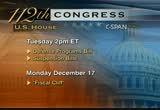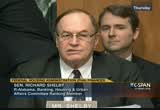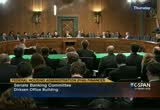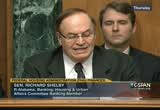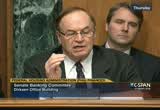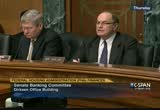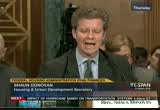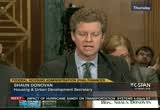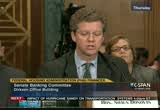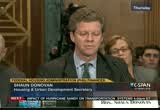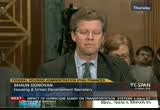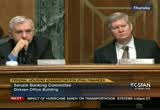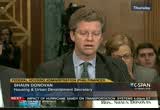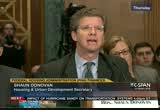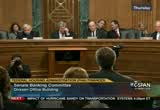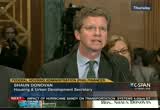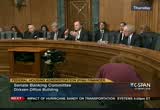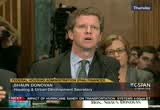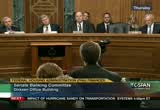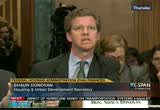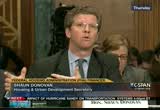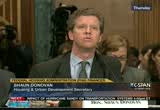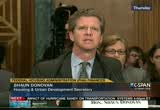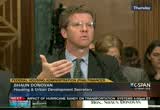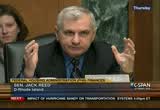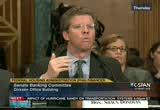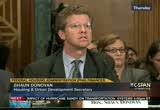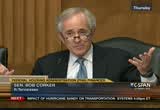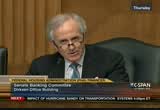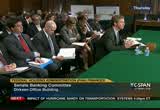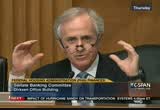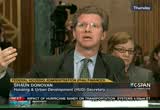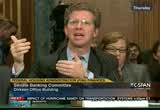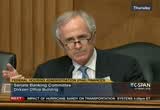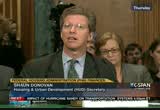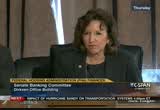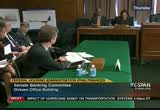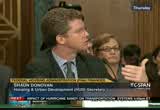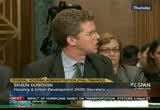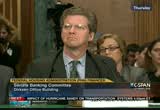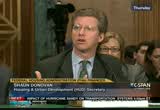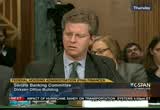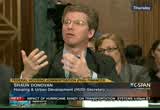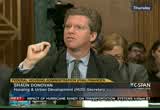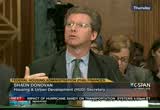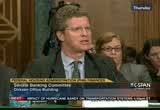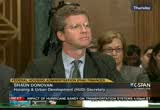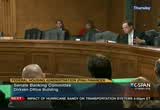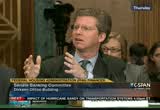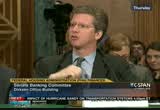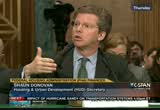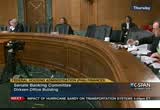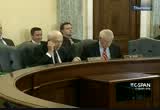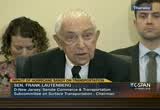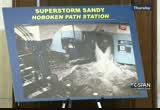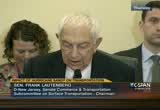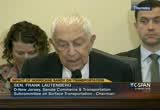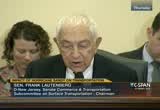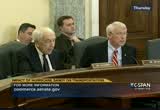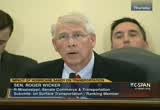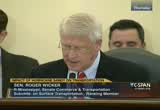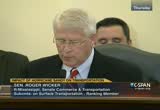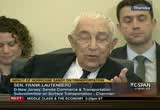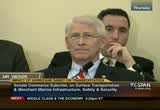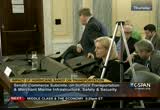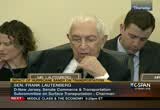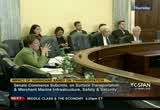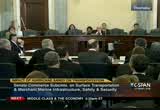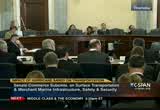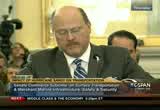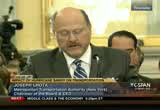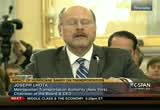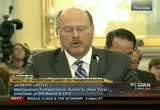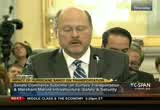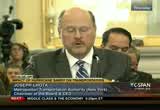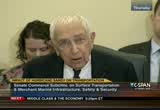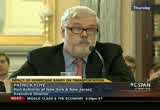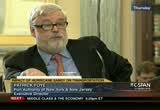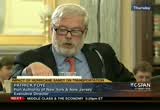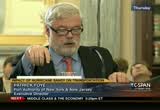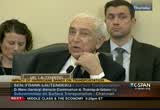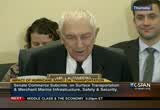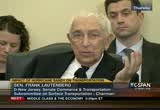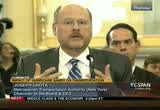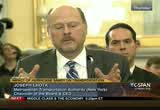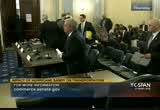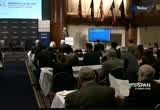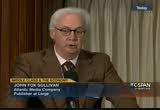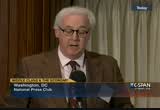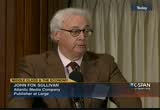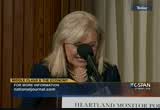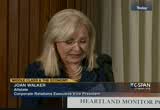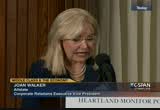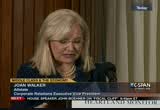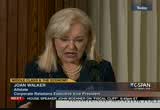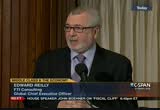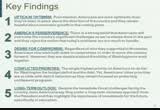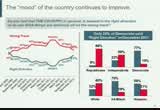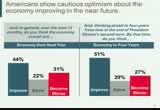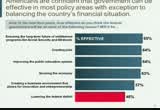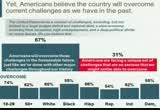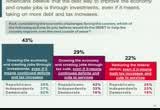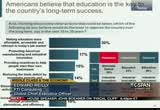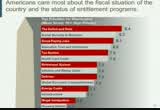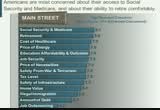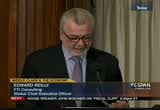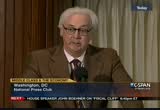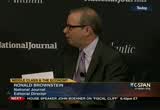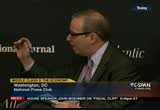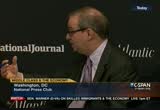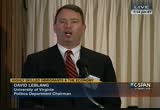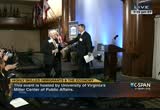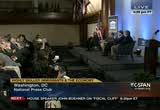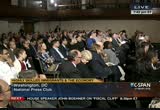tv Politics Public Policy Today CSPAN December 7, 2012 2:00pm-8:00pm EST
2:00 pm
travis. what other musicians? >> ry cooder is my favorite guitar player, but there are many others to choose from. there was an album that was a formative for me. there was a guy coming up called tom rush who played here at the cellar door, and he played in boston at the 47. i really pattern myself after, just a guy with a guitar, full position, unapologetic. and i would say wouldtwo and the beatles. >> what do you think of current pop music? >> you know,
2:01 pm
>> i guess i don't like it a whole lot. >> what would we find -- >> i sound just like my dad. there are great people out there, i know it. and i don't mean to condemn it but i think it's passed me by a little bit. i still have a wonderful career and a beautiful audience that i really love but the spotlight is elsewhere now and i'm a known quantity now. and that's fine with me to play out this hand. but i don't pay a whole lot of attention to -- i never did listen much to the roofment when i was a kid i did.
2:02 pm
i don't listen to music much. kim works with the boston symphony and we get a lot of classic cal music in the house. we have 11-year-old twin boys and they have their preferences, maybe it's because they're playing most of the popular music i'm hearing in the house i have such a negative take on it. >> do you have an i pod? >> no an ipad. >> do you listen to music on there? >> no i listen on cd and vinyl. >> they have said taylor swift is named after you. what do you think of her music? >> i like her music. and i like the name too. i do think she is a creative singer song writer. she's a remarkable marketing
2:03 pm
phenomenon and if she can survive that. and it's a hard thing to survive i think. but she seems to have a very clear head on her shoulders and i think if anyone can, she can make it through and continue to evolve as an artist because it's sort of the marketing hit is if you're lucky enough to be successful, that particular passage that an artist has to make, if he's lucky enough or she's lucky enough can be a real jarring life changing event. it can really shake you up, going from being very private to very public. >> many people have said daniel day lewis portrayal of lincoln in the current film remind them of you. do you have any comment on
2:04 pm
that? >> i've seen the movie and it doesn't look like me to me but i live in here. john williams who is a dear friend and this generation's remarkable musician and composer, john wanted me to play that part. he actually stood up for me there and suggested me at one point. that was never going to happen. i don't know. i'm flattered. of course, everybody loves lincoln, i do. but i don't see other than the fact that we're both tall and somewhat skinny, he speaks much better in public than i do. >> is there a role you would
2:05 pm
like to play? >> no, this is fine. it is very unusual. i've spent my life being myself for a living and i think more than really -- more than anyone else i think i know. i think there are performers who develop and assume a character that they then play for the public. but i don't know anyone who is as much themselves publicly for a living as i am. so it's been an interesting ride. but i don't think i'm qualified to really understand it well, no. >> several people sent this question up so i feel obligated to ask, do you know who carly simon was singing about in you're so vain and will you share that with us?
2:06 pm
>> i think it's warren beatty. >> and he says not. >> that's what my information was but again that information has not been updated for 40 years. [applause] >> now that that the turnpike extends past the city to the airport, any thoughts about revising the song? >> you mean the turnpike no longer ends in boston, it goes all the way to summer set, no. what town is the airport in? >> that's got a ring to it but it doesn't rhyme. that's the thing is the internal rhyme. that song has four rhyming schemes going at once.
2:07 pm
it's got to be boston unless they take it to aust tin texas. [applause] >> i want to thank all of you for joining us this afternoon. i want to remind you of our next lunch on december 18, we have leon panetta, i'm sure if you have some advice on how to stolve fiscal cliff i'm sure heed like to hear that. >> while you are writing your next song i'd like to present you with your coffee mug. it might give you some inspiration.
2:08 pm
>> thank you so much. [applause] >> i want to thank the national press club staff including the journalism broadcast center for organizing today's event. and i was wondering if you had one last song you'd like to sing us out on. >> [applause] >> can she borrow your stool? >> this is my wife kim and here is the song we sing to our twin boys actually about two years ago we went in to sing them to sleep with this lull by and we
2:09 pm
2:18 pm
>> among the iletms on the agenda next week appointing members to a committee to hash out an agreement it was defense bill next year. the house planned to adjourn for the holidays next week but the house will be back in session december 17 to deal with the so called fiscal cliff. the house will not asuren until an agreement is reached. when the house is back in session live coverage as always
2:19 pm
on c-span. a report out of the labor department show that is 146,000 jobs were added in november and the unemployment rate falling to 7.7%, the lowest since december 2008. there had been concern that is hurricane sandy could afblingt the numbers bit only had a minimal effect. employers added fewers jobs in october and september than initially estimate pped and the unemployment rate fell mostly because more people stopped looking for work. earlier today on capitol hill john boehner commented on the fiscal cliff negotiations with reporters. >> this isn't a progress report because there is no progress to report. when it comes to the fiscal cliff that is threatening our economy and jobs the white
2:20 pm
house has wastde another week. secretary gitener came here to offer a plan that had twice the tax hikes that the president campaigned on and had more stimulus spending thanned the in cuts. and an indefinite increase in the debt limit like for ever. now four days ago we offered a serious proposal based on testimony of president clinton's former chief of staff. since then there has been no count offer from the white house. instead reports indicate that the president has adopted a deliberate stradgeji to slow walk our economy right to the edge of the fiscal cliff. instead of reforming the tax code and cutting spending, the president wants to raise tax rates. but even if the president got the tax rate hike that he wanted, understand that we would continue to see trillion dollar deficits for as far as
2:21 pm
the eye can see. washington has got a spending problem, not a revenue problem. if the president doesn't agree with our proposal, i believe he's got an obligation to families and small businesses to offer a plan of his own, a plan that can pass both chambers of the congress. we're ready and eager to talk to the president about such a plan. >> you did speak with the president earlier this week. can you characterize that call? did he have any kind of count offer and we understand that he is making clear that it's got to be increase rates for the wealthy or no deal. are you willing to give a little bit? >> the phone call was pleasant but was more of the same. the conversations that the staff had yesterday were more of the same. it's time for the president if he's serious to come back to was a count offer. >> the jobs record indicated
2:22 pm
unemployment is down roughly a full point from this time last year. if no deal happens -- [inaudible] . why take such a risk when the job numbers are improving. >> because increasing tax rates will hit many small businesses that produce 60 to 70% of the new jobs in our country. that's the whole issue here. >> what -- >> the spt ready to have the economy go off the cliff. >> i think that's recommendless talk. >> you said before the [inaudible] do you still believe that to be the case. racing taxes on small
2:23 pm
businesses is not going to help our economy and not going to help those seeking work. i came out the day after the election to put receive news on the table to take a step toward the topt try to resolve. this when is he going to take a step towards us? >> can you see some way you can agree to tax rate increase and protect small businesses at the same time, maybe going with the 37% or some middle ground? >> there are a lot of things that are possible. but none of it is going to be possible. the president insist on my way or the highway. that's not the way to get to an agreement that i think is important for the american people and very important for our economy. thanks. >> minority leader me lows si
2:24 pm
speak today. here are her remarks. >> this morning we received the news that the economy added 146,000 jobs last month. the unemployment rate fell to 7.7% and we mark the 33 reasonable doubt consecutive month of private sector job growth. our economy is moving forward but it could be growing at a faster rate if the republican leadership had taken up and passed some of president obama's job initiatives including the american jobs act and had passed the middle income tax cut. having done that held off those initiatives, speaker boehner says democrats are slow walking the economy to a fiscal cliff, yet this is the same republican leadership that had the house in session barely a full day
2:25 pm
this week. we've had the election. the president was clear in the campaign that he was advocating and fighting for the middle income tax cut. a tax cut which, by the way, gives everyone 100% of taxpayers a tax break. but it also asks that the upper 2% pay their fair share. since that election four weeks ago, the president -- we've had time, the president has given the republicans flex tobblet come up with a credible specific plan. what they offered in return was an empty letter lacking in specifics. it was a further manifestation of the lack of agreement in the republican caucus with division on the middle income tax cut and no agreement on specifics in their plan, not even senator mcconnell endorsed the house
2:26 pm
republicans proposal. we can make a difference right now by bringing the middle income tax cut up for a vote to give once again, 100% of mernls a tax relief. the senate has passed the bill, the president is poised with his pen to sign it. democrats are unified on it. we have a discharge petition to bring it to the floor. the only obstacle standing in the way of middle income tax relief are the republicans unwilling tons ask the top 2% to pay their fair share. this top 2% which otherwise gets a tax cut, it continues a tax cut in the middle income tax extension. this is a moment of truth. the clock is ticking, christmas is coming, the goose is getting fat but in many homes across america it is a very very lean
2:27 pm
time. the facts are though very important to reiterate. democrats have already agreed in the budget control act and other cuts in this congress to 1.6 trillion dollars in cuts, in spending cuts. we've already agreed in the affordable care act and in the president's budget to over a trillion dollars in savings to medicare without doing any harm to beneficiaries and extended the life of medicare. what is lacking are the revenues. you cannot cut your way to deficit reduction. what does reduce the deficit are jobs, job creation. have the spending cuts, we have the medicare savings, what we need are the revenues. and that is what you have to ask the question, why are we not here to pass the middle income tax cut which unleashes
2:28 pm
the high end -- increases the high end contribution to the budget talks. why are we not here to pass the middle income tax cut? why are we not here to even debate the middle income tax cut? could it be because the republicans are holding the middle income tax cuts as they have all along hostage to tax cuts for the wealthy? as long as they will not touch one hair on the red or get one red scent from the high end we will never have the revenue with the save togs reduce the deficit, to create jobs and grow the economy and improve the lives of the american people. >> [inaudible]
2:29 pm
as i've cede before than subject, what we want to do is protect the middle class. so it's not about the rate, it's about the money. none of this high end tax -- the objection to extending is about being punitive to the high end, it's about getting the money to reduce the deficit, to grow the economy and unleash that power and that middle income tax cut does as well. so again, it depends on how much money you can get. and again, not to say they will pay less and the middle class will pay more. >> [inaudible] . >> no, i don't know that and that's why we should be here to have that kind of a review of the facts.
2:30 pm
but the facts are that at this point 39.6% does produce the revenue and the difficult ration between the% that the president has greated a great deal of money as well. so it's not about the rate and what it brings in, it's the difference of what that brings in $1.6 trillion. >> [inaudible] are you satisfied with the level of communication right now? >> yes, i am. i don't necessarily talk about when and how many times i speak to the president but i'm very satisfied with the communication that i have with the president, that my staff has with his staff and what our lead person on this has with
2:31 pm
the executive branch. temperature knows our views. he shares our values. we feel confident in any negotiation that he takes a lead in. >> this will be the last one. [inaudible] new york city i'm actually very happy about the discharge petition. it's already exceed my expectations in the speed of which our members being here only a limited amount of time this week were able to snand line and stand the petition. the fact is that it's about getting people to sign. it's also about bringing pressure on the leadership to say why are you not bringing this to the floor. is this a forever protection of the wealthiest people in our country at the expense of the middle class. this decoupling is strat to
2:32 pm
solving our fiscal challenge that we have now. don't you wonder yourself why the american people almost 100%, i've never seen a poll that says 100%,over whemingly support. this democrats and republicans support. the senate passed it, the president is poised to sign it. why would they block that except to protect the high end? >> we'll take one more. >> [inaudible] did you have any concern about increased debt over to the executive branch. >> my understanding is they are talking about the mcconnell rule which is the president would send his proposal over and let 2/3 of the congress rejected it then the president's lifting of the debt
2:33 pm
ceiling would stand. the white house and the house democrats are on the same page on the debt ceiling question. thank you. >> tonight at 7:00, mark warrener will discuss legislation he's sponsoring which will allow more highly skilled immigrants the u.s. that's live at 7:00 p.m. eastern on c-span. >> i think riders institute is something that's important within the culture. we are a culture of words of voices. words are key to our imagination, our capacity to envision things.
2:34 pm
we ourselves are not completely tied to print on the page of writing but i think that there is no other art form so readily accessible other than perhaps film. but there is something in literature that cap chures the hunal spirit. >> this weekend join book tv as we look tpwhind scenes at the literary life of new york's capital city albany. >> senators from new york and new jersey say hurricane sandy caused $5 billion worth of damage to rail subway and port
2:35 pm
infrastructure in their state. they testified on surface transportation yesterday. >> i call this hearing to order. thank you for joining us, mr. secretary. i asked you to testify today because i'm deeply concerned about the recent report that the f.h.a. could potentially need taxpayer support for the first time in its 78-year history. i would like you to help the committee gain insight into the fiscal challenges at the f.h.a.
2:36 pm
and what h.u.d. has done and can do to mitigate losses and address the shortfall in the capital reserve ratio. f.h.a. has been helping save lives of the mortgage market by ensuring that qualified lower to moderate income and first time home buyers have access to credit since 1934. since the beginning of the financial crisis, the f.h.a. has increased its market share from below 5% in 2006 to about 30% at its peak volume in 2009, in pursuant of that mission. this cyclical expansion was essential to the mortgage market, especially for first time home buyers who have comprised 78% of single family loans insured by f.h.a. in 2011. f.h.a.'s multifamily and health
2:37 pm
care insurance programs have also played an important cyclical role since the financial crisis with a fourfold increase in volume from 2008 to 2011. according to mark sandy, chief economist at moody's analytics, without the f.h.a.'s counter cyclical support, and i quote, the housing market would have quit taking the economy with it. providing the backstop for mortgage credit when public services flee from the market has a cost. the losses at f.h.a. to stem from the new now prohibited down payment program, heavy losses in the first mortgage program, and losses -- loans made at the height of the
2:38 pm
crisis to prevent a collapse of the housing market. while they have already taken action to pretext the financial mortgage fund for single family loans from seeking federal funds, the f.y. 2012 report suggests that much more needs to be done to prevent such a draw. i want to hear more today about the administration's actions and proposals to minimize the risk to taxpayers stemming from their business and what safeguards are in place to ensure the quality and sustainability of the program. if the administration's actions and proposals will not be sufficient to restore f.h.a.'s fiscal health, i'm inclined to work with my colleagues on both sides of the aisle on the banking committee to find a bipartisan way to make shoo --
2:39 pm
that happen. before i turn to ranking member shelby, i want to recognize his work as ranking member on this committee over the past six years. this may be our last hearing together this year, and we will have no ranking member next year. i'm part of our bipartisan record over the last two years we continued it the tradition of bipartisanship that this committee has been known for by passing signature bills together this congress. and i thank senator shelby for his service. with that i turn to ranking member shelby. >> thank you, mr. chairman. first of all i appreciate your remarks. i have been on this committee 26 years, ending it, but i'm not ending, i just have to move down a notch as i go over, hopefully, to be the ranking on appropriations.
2:40 pm
i won't be far away. i won't be far from secretary on h.u.d. stuff, either. but i enjoy working this committee. i enjoyed being chairman of this committee two congresses, the people on this committee are superb. the staffs are superb and this is a very important committee. not only for the senate, but for the american people and perhaps the world. as most people know, people are active on this committee because banking and housing and everything that goes with it goes right to the heart of what ticks in america. job creation, availability of money, the regulation of our banks, the securities and exchange commission t. money laundering, sanctions on iran, you name it. most of it, this is an active committee, so i'll be around. right near here but i'll be yielding -- moving down one notch next to senator crapo,
2:41 pm
and will he do well. having said that, welcome again, mr. secretary. just days after the president's re-election, the f.h.a. released its 2012 actuarial report which revealed that the economic value of the f.h.a. fund has fallen to negative $16 billion. a lot of money. that means the fund's capital reserve ratio, as i understand it, now stands at a negative 1.44%. this news is obviously very disturbing to us and to the secretary. for those of us who have long been concerned about the health of the f.h.a. for years the problems of the federal housing administration have been well-known. during the housing boom, the f.h.a. unwisely, i thought, guaranteed millions of risky mortgages with low down payments to borrowers with poor credit scores.
2:42 pm
we are reaping that now. these mortgages have resulted in billions of losses to the f.h.a. the federal housing administration has made matters worse, i think, by failing to come to grips with the magnitude, mr. secretary, of the problems. back in 2007, as the federal housing administration's poor financial position was becoming clear to all, including right here in this committee, i urged the f.h.a. to devise a credible plan to improve its finances. i stated then and i'll quote, that before the taxpayers are faced with greater loss, i believe we must determine how the f.h.a. got into this position, mr. secretary, and how it intends to get out. unfortunately for the past five years the f.h.a.'s leadership has understated their problems and sought to kick the can down the road. this is now the fourth year in a row that the f.h.a. fund has been below its statutory minimum capital levels.
2:43 pm
yet each year we are told that this is a temporary dip and that within a few years everything will be fine. in fact, in 2009, mr. secretary, you told this committee that the drop in the capital ratio was expected to be, quote, temporary, and that it would, quote, return above 2% within the next two or three years, even if f.h.a. were to make no policy changes at all. we now know this forecast is way off the mark. the administration, however, continued to be optimistic. in 2011, for example, h.u.d. still had its projection showing the f.h.a.'s capital ratio reaching 2% in 2014. now despite all these reassurances, the actuarial report projects that the f.h.a.
2:44 pm
fund has a capital reserve, as i mentioned earlier, of a negative 1.44%. what is the response of the f.h.a.'s leadership here? just this year after further declines in the f.h.a. fund, both secretary donovan and acting f.h.a. commissioner carol gallant, testified to two different senate committees that the fund would, quote, return to the congressionally mandated capital reserve ratio of 2% by 2015. needless to say i'm not nearly as optimistic about the future of the f.h.a. i hope it works. i hope it does. the inability of f.h.a.'s leadership to clearly recognize and address its problems is raising doubts, mr. secretary, about the credibility and willingness to properly manage f.h.a.'s financing. i think it's time for f.h.a. to face facts. we have to. first, the capital reserve ratio, the federal housing administration fund, is dangerously low.
2:45 pm
you know that. and has shrunk nearly every year since 2006. f.h.a.'s statutory obligations every year since 2008. third, every year since then future growth in the capital ratio has underperformed in relation to f.h.a.'s predictions. hopefully the shock produced by these latest projections will finally be a wake-up call for everyone. hard choices lie ahead for this program. we have talked about this. f.h.a. leadership, i believe, must fully realize its existing authority to shore up the value of this fund. additionally, congress must consider reductions in permissible risk layering and further underwriting reforms and re-examine --
2:46 pm
re-examination of premium structures. it's time, i believe, to get serious reform of f.h.a. before it needs a taxpayer bailout, if it isn't too late already. i wish you well, mr. secretary, but you have a real challenge here. we do with you. thank you. >> thank you, senator shelby. are there any other members who wish to make a brief opening statement? >> thanks, mr. chairman. just briefly i want to agree with the comments of our ranking member, mr. shelby. and our general concern is that we have seen this coming for a while. we have been talking about it. and the response from the administration has been very modest. unfortunately our worst fears are coming true, and even today i'm very concerned that the response even given this news is just way too modest. in discussing last year's actuarial report, the acting
2:47 pm
commissioner, carol gallante, said there is no evidence or widespread prediction that home prices are going to decline to the kind of levels that would require a bailout. yet right now the question is quickly becoming not if but when. and still even in the testimony -- secretary's testimony today, we are only talking about things like waiting until the second quarter of next year to raise premiums and then it by 10 basis points. i really urge the secretary and others to consider other more aggressive, more proactive measures. mean "the washington post," which is not exactly a right wing think tank, said recently, quote, right now the critics are starting to look pretty prescient. affordable possession of one's
2:48 pm
own home is the american dream. government support excessive borrowing has turned into a national nightmare, close quote. and the focus of that editorial was, we still haven't fundamentally reformed that, including at f.h.a. so i hope we start getting on that track starting today. thank you, mr. chairman. >> senator menendez. >> thank you very much. i'll be brief. i look forward to hearing the secretary's response on how f.h.a. balances the goals of remaining self-sufficient without taxpayer funds, but also helping what is still a fragile housing market in ensuring first-time home buyers can get credit. there is a clear case to be made in my mind that but for f.h.a. in the midst of this housing crisis, we would have a far greater crisis on our
2:49 pm
hands. and so reconciling the fiduciary responsibilities here to the taxpayers as well as the mission to people of america is incredibly important. i look forward to hearing that. and with your indulgence, mr. chairman, when it comes to my time in questions, while i certainly care about f.h.a., i have a even more pressing issue in the state of new jersey after thousands of homes were lost, lives were lost, and we are facing the greatest devastation the state has ever had. the secretary has been charged by the president in that regard, to be the, i call it, czar, but whatever the appropriate title is, and i will have some questions in that regard on behalf of my state. thank you. >> thank you. i want to remind my colleagues that the record will be opened for the next seven days for opening statements and any other materials you would like to submit. now i would like to briefly introduced our witness, the honorable shaun donovan is the 15th secretary of housing and
2:50 pm
urban development. this is his ninth time before the full committee. secretary donovan, you may proceed with your testimony. >> mr. chairman. thank you, ranking member shelby, members of the committee, thank you for the opportunity to testify today regarding the status of the federal housing administration's mortgage insurance programs. i, too, want to add my thanks to ranking member shelby for his leadership and partnership on so many issues these last few years. this is an important moment for our housing market and our nation's economic recovery. as 2012 draws to a close, there are encouraging signs. housing construction growing faster than any time since 2008. the strongest year of home sales since the economic crisis began. and rising home values lifting 1.3 million families above water in the first half of the year alone. f.h.a.'s programs have been a critical component of this recovery. that should come no surprise given the program's goals and history. with the dual mission of
2:51 pm
providing access for homeownership for underserved populations and critical financing for multifamily developments, nursing homes, assisted living properties, and hospitals, the f.h.a. is designed to fill gaps in the market, meet important commute needs, and act as a stabilizing force during economic distress. it's clear that f.h.a. has done just that. by ensuring much needed liquidity in the nation's mortgage finance markets, f.h.a. was a vital stabilizing force as we experienced the worst economic decline since the great depression. in the last four years, the f.h.a.'s made homeownership possible for over 3.5 million families, including 2.8 million first-time buyers, and for 50% of all african-american and latino home buyers last year. while f.h.a. has acted as a critical support, it has not been immune to the stresses of falling home values and rising unemployment of the recession. according to the independent actuary's annual report on the m.m.i. fund, this fiscal year, the capital reserve ratio fell below zero to negative 1.44%,
2:52 pm
representing a value of negative $16.3 billion. we take and i take these findings extremely seriously. as stewards of taxpayer dollars, we have, since the start of this administration, made it a priority to strengthen the fund. and we are continuing to take aggressive action to return the fund to fiscal health, including those measures just announced in our annual report to congress. it's important for me to start by highlighting several key points that put the actuary's report in perspective. fully $70 billion in claims are attributable just to the 2007 to 2009 books and business. these three years are the major source of stress to the fund. in fact, in its report, the actuary attests to the high quality and significant profitability of the books insured since 2010, the strongest in the agency's history. it's important to understand this report does not in and of itself mean it will be necessary for the f.h.a. to use its authority to draw from the
2:53 pm
treasury to cover projected losses. while this possibility obviously exists, it is dependent on several factors. first, that determination would be made using the assumptions in the president's budget to be released in february, not the assumptions used in the actuary's report. second, we expect that the new books of business generated after 2012 will create approximately $11 billion in economic value, further strengthening the m.m.i. fund. third, since the actuarial report is a point in time snapshot, it does not take into account changes f.h.a. recently has announced to address the health of the fund. the final accounting of any shortfall would be done at the end of fiscal year 2013 in order to determine whether funds from the treasury are necessary. i'd also like to address the primary drivers of the decline in the capital reserve ratio as compared to last year's projections. first, the house price appreciation estimates used by the actuary for this review were significantly lower than those used last year.
2:54 pm
that may seem counter intuitive given the economic progress we have seen, but the actual turn around in the market occurred later than was projected in last year's forecast. in addition, for technical reasons, the forecast is also somewhat artificially dampened by the significant increase in refinancing activity in the market this year. second, the continued decline in interest rates while good for the overall economy impacts the actuarys model by indicating marginally higher results. third, based on recommendations made by the g.a.o. and h.u.d.s i.g., and at the direction of f.h.a., in this year's report the actuary changed the way it reflects losses from defaulted loans and reverse mortgages in the economic value of the m.m.i. fund. let me be clear, these are all important factors to consider when explaining the current status of the fund, but they do not minimize the seriousness of this report in any way. as i said at the outset, we
2:55 pm
have already taken significant actions to protect and strengthen the fund, including premium increases and changes to credit policy, such as increasing down payments for lower credit score borrowers, and ending seller financed down payment assistance. with your help, our efforts have added well over $32 billion to the fund. the measures i will outline today further address the primary source of the problem. losses stemming from legacy books and business, particularly those insured during the 2007 to 2009 period and are designed to reduce our loss severities by at least 5%, generating approximately $3 billion in economic value over the next two years. first, we have announced changes to our loss mitigation program that targets deeper levels of relief for struggling borrowers to more effectively assist families in meeting their obligations and avoid costly foreclosures for f.h.a. similarly we are streamlining the use of short sales and aligning our practices recently announced to provide more families the opportunity to
2:56 pm
avoid foreclosure while reducing costs for the f.h.a. we have dramatically increased the use of alternative dispositions for defaulted loans, including our new distressed asset stabilization program. the improvement in recoveries from f.h.a. to this program is estimated over $1 billion this year alone. we are also taking proactive measures on new loans. in particular we are reversing a policy change made over a decade ago that allowed borrowers to stop paying premiums after their loans reached a certain loan to value ratio. this change left the f.h.a. without premiums to cover the losses on loans held beyond the period for which those premiums were collected. reversing the policy is expected to improve the value of the fund by $2.6 billion in this fiscal year alone. in addition, we'll raise our annual mortgage insurance premiums by 10 basis points. we estimate this will increase cost to new borrowers by about $13 per month, but it will also further reduce our footprint in the market while adding an
2:57 pm
estimated $1 billion of additional economic value to the fund this year. as private capital returns, f.h.a. must continue to balance pricing to ensure it occupies a smaller, healthier share of the market. in fact, f.h.a.'s market share has been declining since 2009 and 2012 represents our lowest volume year since the start of the economic crisis. while i focus today on f.h.a.'s single family programs, i wanted to take the opportunity to reassure the committee our efforts to protect our insurance funds span the range of our programs. we have already raised our mortgage insurance premiums on multifamily and health care loans, and instituted other risk management reforms such as special reviews for large loans, post commitment reviews by credit risk officers, and enacted loan -- an active loan committee process. even as we use our existing authority to take these measures to protect the fund, other actions require your partnership. in addition to the increased indemnification authority and broader geographical enforcement powers recently passed by the house, we have a number of proposals designed to place f.h.a.
2:58 pm
in a stronger fiscal position over the next 12 months and beyond. including new loss mitigation authority, additional enforcement authority, and greater administrative flexibility in managing the reverse mortgage program. house has recently passed important bipartisan f.h.a. reform legislation and we look forward to continuing to work with both chambers to create the tools we need to strengthen the program, meet its mission, and place the m.m.i. fund back on firm footing. i encourage the senate to engage in discussions that build on this progress in the house in order to achieve a consensus that will give f.h.a. these tools as quickly as possible. there are no guarantees that the actions i have described will prevent f.h.a. from tapping into the treasury next september. however, swift action from congress, coupled with the $11 billion in additional value from the new fiscal year 2013 business, will reduce the likelihood that a treasury draw will be necessary. furthermore, these changes, as well as those we made over the past four years, have laid the foundation for a stronger
2:59 pm
f.h.a. and a healthier m.m.i. fund that supports the recovery of the housing market and economy, while actively reducing f.h.a.'s market share. as we work together to adapt and reform the f.h.a. program, we must proceed with a balanced approach that recognizes both the challenges to f.h.a. and its contributions to our economy. we are eager to work with you to achieve these shared goals. thank you again for the opportunity to testify today. i look forward to taking your questions. >> thank you for your testimony. as we begin questions, i will ask the clerk to put five minutes on the clock for each member.secretary donovan, i'm vy concerned about the f.h.a.'s fiscal condition as detailed by the f.y. 2012 report, particularly the negative capital reserve ratio. what action have you taken to restore f.h.a.'s capital reserve and prevent f.h.a. from requesting taxpayer support?
3:00 pm
>> mr. chairman, the most important actions that we have taken have been in partnership with this committee, and i would particularly recognize the fact that you passed a ban on seller funded down payments, which went into effect and we implemented in 2009. that action alone, we believe, has saved the f.h.a. fund about $12 billion. there are additional actions that we have taken. we have raised premiums four times. made underwriting changes that include raising down payments for the riskiest borrowers. that series of changes has added, we estimate, an additional $20 billion to the value of the fund. quite simply, if we had not taken those actions in partnership with you, we would find ourselves in a vastly worse position today for the f.h.a. fund.
3:01 pm
>> mr. secretary, you have detailed several steps that would help stabilize f.h.a.'s finances. given the condition of the f.h.a.'s old books of business, why weren't these changes made earlier? will these changes allow the f.h.a. to outperform projections again this year and avoid drawing funds from the treasury? >> as i said in my testimony, i cannot guarantee that we won't need to draw at the end of the fiscal year. what i can say is that i believe we are taking all appropriate steps to try to avoid that. balancing both the health of the fund but also the fragile recovery that we have in the market. for example, we have already
3:02 pm
moved to increase premiums for the fifth time. we believe that that is an appropriate step and that it leaves f.h.a. appropriately priced. we would be concerned, however, about going significantly further in raising premiums, both because it would have potential negative impacts on the housing market. we are seeing a recovery, but it is still fragile, and we do not want to hurt the market and in turn hurt the f.h.a. fund by going too far to stop that recovery. but i would also suggest, as you see in the chart, on the right, we are currently, and the independent actuary confirms this, that the new books of business are highly profitable. and so i think there is beyond the market question a question of how far do we go in visiting the sins of the past on new borrowers? the premiums being paid by new
3:03 pm
borrowers more than cover the expected losses. we think that's appropriately priced and will help to shrink our market share, but what we need to do is continue to focus on these older books of business and that's why i focused in the changes that we have made we announced in our report to congress on steps that will increase our collections from these older books of business. just from the asset sales that we have instituted and were going to ramp up going forward, we have increased the returns on these distressed loans by mortgage than 10%. .- by more than 10% simply with those steps. so we need to continue to focus on things and we have asked for authority from you to take steps that would help increase our returns on the older books of business. we think those are the most appropriate measures we can take. >> secretary donovan, one of these steps is better loss bit migation by transferring insurancing from servicers who
3:04 pm
are underperforming. what is preventing f.h.a. from doing that under its existing servicing contracts? >> quite simply we need legislative authority to be able to force those transfers to happen. that is a critical step. it is something that we have seen in the private market start to increasingly happen. it's something we believe would be very helpful to send a very strong message to those servicers that are underperforming. but it is one of a number of steps that we would ask that you give us legislative authority for as quickly as possible. >> one more question. secretary donovan, the actuarial report finding of the negative in the m.m.i. fund is mainly problem legacy loans
3:05 pm
guaranteed during the housing bubble. what steps has f.h.a. taken to improve its underwriting criteria and risk assessments for the new loans? >> as i mentioned earlier, clearly the steps that you took to ban seller funded down payment loans were a critical piece of that. we also looked at the performance of our loans very carefully. so in addition to the premium increases, we did require a 10% down payment for our riskiest borrowers. that we believe was a very important step in changing our underwriting. we also have taken many other steps on other aspects of underwriting that have to do with what costs can be rolled into the loan and other steps
3:06 pm
that reduce the effective risk of those loans that are quite important. part of that has been able to be done because, quite frankly, we didn't have a strong enough risk focus at f.h.a. in the midst of the crisis. we have created a very strong risk management focus through the creation of a chief risk officer for f.h.a. that's never existed before. as well as building a team of analysts that are really providing data on an ongoing basis on early payment defaults and a whole range of other information that we simply didn't have before in real time. so it's not only the underwriting changes themselves. it's also the focus on risk and the way that we are measuring it on a real time basis that has given us new tools. >> senator shelby. >> thank you, mr. chairman. secretary donovan, lead me through this.
3:07 pm
orl me if i'm wrong on this right or what. it's my understanding that under the statutes now prevailing that the federal housing administration could, if necessary, you deemed it necessary, tap the treasury for an endless supply of money. a lot of us would call that a bailout. do you anticipate that? can you assure us and the american people today as the secretary of h.u.d. that f.h.a. will not do that? or you don't know yet? >> senator, i wish i could -- hi a crystal ball and coy tell you that we won't at the end of the year. given the actuarial report this year, obviously i'm highly concerned about that possibility. >> getting close? >> certainly we are closer than we have been in the past.
3:08 pm
>> how close are you? >> well -- >> honestly. >> what i will tell you, again, an independent actuarial report is the best can i give you in terms of that view. >> that's not good, is it? >> what it says -- >> the actuarial report is not good. >> it isn't. one important piece of this is that the -- what is required for the actuarial is a review as if we stopped doing business on the date of the actuarial. the important thing that we can do and that we have done to try to avoid taking funds from the treasury at the end of the year is to look at the revenue we expect this year, that's about $11 billion, and to make changes to underwriting and other steps that would help avoid that. >> does that include up in the premium -- upping the premium a little? >> we have already moved to increase the premium an additional 10 basis points, an average of about $13 a month. >> how much money would that be projected?
3:09 pm
>> that would add about $1 billion just this year alone. and much more into the future. >> what is the size of your portfolio today, roughly? >> it is over $1 trillion when you combine -- >> $1 trillion worth of loans? >> when you combine all the various programs. >> how much -- how close are you as far as working capital so to speak? >> it's an important question. today, even though the actuarial report shows a negative balance, we have a cash balance of over $30 billion today. $30.5 billion. one of the things the actuary looks at, assume we continue to do business, assume that we continue to operate, what is the likelihood, obviously we plan to continue to operate, what is the likelihood that we actually -- the cash balance goes negative? and the actuarial, despite the
3:10 pm
worst condition this year, still has a less than 5% chance that we actually run through all of those cash reserves. >> gives us the worst case scenario. it's the first week of december now. say three weeks, what's your worst case scenario, getting up to the first of the year, where you might be or not be? what would cause you to -- cause to you have a lot of heartburn say around the first of the year? >> the single greatest issue of concern is where the housing market will go from here. if the housing market continues to recover as it has this year, that's the most important thing that we can see to restore the fund to health. house price appreciation is the single most important variable in the health of the fund going forward. it that is also why i will say
3:11 pm
we are so concerned about balancing the steps that we are taking to make sure we are not doing anything that would impede the recovery and come back and harm the f.h.a. in the long run by decreasing the improvement that we see in housing markets. >> we all realize that f.h.a. serves a good purpose, but it's just not sound financially. as the secretary of h.u.d., shouldn't the fiscal well-being of f.h.a. be one of your highest priorities? >> absolutely. absolutely. dealu're just going to with what comes up like you outlined today? >> i would welcome additional ideas and suggestions that you may have. i certainly feel that we will take steps within our power. we would like to work with you, as i have said, as quickly as possible, to move additional
3:12 pm
authorities that would help us do this, but i am also opened today or any time to additional suggestions about what further steps we could take. >> if you do tap the treasury, in other words there's a bailout, so to speak, it's a sizable one, how would you pay that money back? premiums? better efficiency? the housing recovery? all of the above? >> we certainly believe that we need to keep f.h.a. in a position where our new books of business are producing substantial revenue for the taxpayer. this year alone we expect our new loans to return a $10 billion profit, if i could use that term, to the taxpayer. that is the way that we need to continue to restore the health of the fund and should we need to draw on the treasury to restore that money to the taxpayer. >> thanks, mr. chairman.
3:13 pm
>> senator reed. >> thank you very much, mr. chairman. thank you, mr. secretary. i repeat what my colleagues have said. it's very disturbing to have a report that shows 1.4% negative equity at a critical fund. and this is an issue that has not suddenly emerged. it's been brewing over several years. you have indicated that you are taking steps to fix these problems. and many people have said that in the past, too. again, can you sort of give us some assurance that this time is different? >> what i can say, senator, is that i believe we are taking every responsible measure that we can to improve the health of the fund.
3:14 pm
while at the same time not hurting the fragile recovery that we have. i do not have a crystal ball and i believe that we need to continue to take input and guidance on getting a better picture of the fund. one of the reasons why the fund looks significantly worse this year than it did last year, we got criticism last year from outside experts, from the g.a.o., from our i.g. of the way that we model claims in our actuarial. we went back and directed our actuary to change the way we model, and that alone, that change alone, subtracted $13 billion from the value of the fund. i'm not going to sit here and say we have been perfect in the way we looked at the fund or we have modeled it. one of my responsibilities is continue to make changes to get as accurate a picture as we possibly can and to take steps
3:15 pm
based on that. >> let me ask perhaps a related question, as you look forward in terms of the health of the fund, one fact would seem to me, i would assume it would be explicitly in the model, would be assuming about employment rates going forward. what unemployment rate are you assuming over the next year or so? because it directly affected payment -- >> absolutely. one of the important changes we made to the model this year not to get too wonky here, is to go to something called sacastic modeling. we chose one path and modeled based on that. state of the art modeling, assigns probabilities to a whole different range of paths the economy might go through. we actually modeled a vast range of scenarios. one of the things we looked at last year that we directed our
3:16 pm
actuaries to look at last year was to say what if interest rates go low? what's going to happen to the fund? we ran that last year. that scenario predicted that the fund would go negative. in fact, we have had what is effectively the low interest rate scenario happen this year with qe-3. that was clearly had a substantial impact, roughly a $10 billion negative impact on the fund just from those interest rates alone. those are clearly steps that we are taking. we would be happy to share with you the various unemployment rate scenarios that we are looking at and home price paths we are looking at, but again we look at a range of those to get to the best possible prediction. >> you got close to wonkiness with sacastic modeling. one of the problems that you
3:17 pm
face is this series of years of terribly mispriced loans in 2007, 2009. and it would seem to me one of the things that you are trying to do is to clear these as quickly as possible. but as you have indicated to us, you need help with servicing. that you have to do much more aggressive modification, sales, and also for the real estate that effectively alone, you have to dispose of it. can you comment on how much you think you can achieve in relieving pressure on the fund by doing that? looking back and taking care of that period? >> we think with a set of changes that we are already taking, that we announced in our report to congress with the actuarial, that include the loan sales that we have taken, changes to short sales, changes to what we call our loss mitigation waterfall, how we work with borrowers that are in trouble, those alone could add
3:18 pm
about $3 billion to the fund over the next couple years. what we need help on is that many of our enforcement authorities, and again if you think about how we collect on the bad loans, enforcement is an important piece of that. to say to lenders, you made a bad loan, there was fraud or something else involved, we need to hold you accountable for that and bring funding back to the taxpayer. there are a number of provision that is would help us. one is giving us broader geographic authority. we have some perverse restrictions right now in legislation in terms of the way that we can hold lenders accountable on a narrow geographic basis. what we can do to require indemnification of loans, the standard for fraud, those are all pieces of what we would want to work with you to get past very quickly -- passed very quickly to enhance our enforcement authority. those as well would likely add billions of dollars to the fund. as you know we have been able to recovery well over $1
3:19 pm
billion just this year in settlements around servicing and originations with many of our biggest lenders. >> thank you very much, mr.secretary. thank you, mr. chairman. thank you for your testimony today. you asked for some suggestions and i'd like to make just a few. it's my understanding that on the private side right now fico score is really at 620, where the market is. and f.h.a. is at 580 and basically it's creating a situation where the private lenders are being made out to be bad guys because even though your fico scores are 580, they are not doing anything before -- below 620. as one of the steps that you might take, would it make sense for you to go ahead and get on up to 620? right now there's huge demand out there, and at some point
3:20 pm
that's going to diminish and will drive back down as people try to get market share again. would it not make sense to go ahead and implement what the market is telling you to do? >> that is something that we are actually looking at. i think it's likely that we take additional steps as we are working towards the president's budget and understanding in more detail the results of the actuarial. that is clearly something we are looking at. we are concerned that some of the overlays that lenders are putting on go farther than are necessary. in other words, we do believe that there's been an over direction, if you will, in some parts of the market, where we have what are very safe borrowers that are having a hard time accessing credit. but i also agree that we need to be looking at and perhaps adjusting on the fico side as well. >> generally for what it's worth, i appreciate your testimony today.
3:21 pm
i know we have had discussions about that sometimes in the past. and i do realize you had a lot of bad loans on the books that you inherited. i do think there are things you can do now to really cause the fund to be more -- far more sound. i do think you all are being slow in moving that way. a second one i would move to is reverse mortgages. you are losing your shirt on reverse mortgages. losing your shirt. it's a small part of what you're doing, and yet you've got mortgage brokers out there that are making an absolute fortune right now, a fortune. some of them are good operators. a lot of them are sloppy operators. i don't understand why you don't shut the program down for 24 months as i know has been suggested to you? why don't you do that? >> once again, senator, you have hit on an issue that is an important one and that we do believe we need to make changes. >> why don't you just do it? >> frankly, we did make changes. we introduced a much safer,
3:22 pm
better, we thought, alternative through our safer -- saver program. we could effectively do what you said, which is to just create a moratorium on the other program. what we are concerned about is particularly given the economic crisis that seniors have gone through, that we would be eliminating an option that works for some seniors, if it's done safely, in order to eliminate also the bad loans being made. our preference, if we could get authority from you to change the structure of the program to make it much more effective and safe, that would be a better way to go. if we can't get that authority quickly, we'll have -- >> i would think -- why can't we do a unanimous consent, it seems to me most people would be willing to do that? >> let's talk about that today. i would love to -- >> i know you've got a partial situation that has been very healthy. it seems to me if you're worried about seniors, you could keep the ability to draw down a
3:23 pm
partial amount which is very safe, and you would eliminate -- you could do that all by yourself. and we could worry about the legislation whenever it's time. i'm willing to look at it now. just for what it's worth it does feel like there's a lot you could do to make f.h.a. healthy today that is not being done. let's talk further, ok. loan limits. seems like right now, fannie and freddie are down at 625. are you still up at 729. wouldn't it make sense to go ahead now and make some changes that need to be made? you can do that yourself. why don't we do that? >> as i think you know, we supported our loan limits coming down. and they were supposed to expire last year. congress made the decision to allow -- lower the g.s.e.'s loan limits but kept f.h.a.'s -- >> can you self-implement that?
3:24 pm
you cannot do that? >> i do not believe that given that congress explicitly extended those higher limits, that we can take that step. >> would you like for us to help you do that? >> we have supported before and i will state again today that going back to the limits makes real sense. i will go further than that, that we should lay out a path to go back to even lower limits that existed before the crisis in a way that is done consistent with how we do housing finance reform. that is a larger question. but the immediate step of going back to the pre-era limits is one we would support. >> are you developing a fan. and i hope we could look at some of those things. home mortgage insurance. the way i understand that it works is private mortgage insurers when you get down to a certain loan to value ratio,
3:25 pm
the insurance -- the premium is dropped, but also the insurance is dropped. and yet you have a trillion dollars in loans on your books where the loan to value has dropped. they are no longer paying premiums, but you are keeping the guarantee in place. that doesn't make any sense to me. and why don't you continue to make the homeowner, who has that guarantee, continue to make the premium payments? that would be something that seems to me would be extremely helpful to you during this difficult time. >> once again, an excellent suggestion. we announced with our report to congress that we were -- we are doing that for new loans. >> why not the ones on the books? >> unfortunately we can't go
3:26 pm
back and modify a contract. when that homeowner took that loan, they signed a deal with f.h.a. that said this is the way the premium structure would work. we looked at this. we fully analyzed it. we can't break those contracts, unfortunately. and so it's something that we are going to need to implement. i will say, however, that the value of doing it now in a low interest rate environment is substantially larger on these new loans for two reasons. the lower the interest rate, the faster the amortization of the principal and therefore this will be a more valuable change. second because these loans are so low interest rate, they will be on our books far larger. frankly, not many loans in the past have hit that limit. so even though it's $1 trillion portfolio, the value of that change is quite small for the old loans. it's really going to be quite valuable for these newer very low interest rate loans. >> i'll be briefly two more questions. i see that f.h.a. is now making loans to people who three years ago were foreclosed upon.
3:27 pm
and that's a very different standard than even exists at fannie and freddie. i don't understand. why are you doing that? >> this is another area where we are working on changes. here's the issue. we have a significant number of homeowners that were responsible homeowners, had good credit scores that lost their jobs in the biggest economic crisis this country has faced since the depression. and we believe if somebody can show that they are back at the work and responsible borrower again, that that's somebody that we ought to work with. i would agree that our standards are not clear enough in dividing those. so what we believe we need to do is clarify those standards but not necessarily eliminate the possibility that somebody who has done the right thing and through no fault of their own lost a job but can be a responsible homeowner again, has the chance.
3:28 pm
justew would be it's not the three-year limit that's important, it's what are the criteria that we set for how somebody re-establishes their credit and being a responsible homeowner? >> my last question, thank you for your patience. first of all it sounds like there is a lot of things -- there are a lot of things that could be done right now to solve a lot of problems. and i hope that we as a committee will figure out a way to work with you on those things. we need to work with you. but you can do the things you can do now. you and i had a pretty long conversation several months ago when carol gallante had the opportunity, candidly, to assume her post on a permanent basis. and we could not get the administration to agree to not airdrop something and bypass the committee. it's an unfortunate circumstance. but i guess as i look at it, i would just ask you the question, did we dodge a bullet in appointing her full-time with
3:29 pm
all the issues that we have at f.h.a.? and does she really have the ability to press the administration to overcome political issues to actually cause the fund itself to be actuarially sound? because it appears to me that we are still not quite doing the things we ought to do to make the fund operate. it seems to me maybe there's a little political pressure and maybe she's not strong enough to make that happen. >> here are the facts as i see country. police we have taken the most aggressive steps in the history of people agency to make sure the business we are doing is strong. if you look at that chart right there, you will see a huge profitability relative to the history for the new loans we are making.
3:30 pm
we have only so much that we can do to fix the problems of those older loans. i agree with you on many of the steps you have described today. what we should not imagine is that somehow taking those steps can take us from the difficult financial condition we find them in today, somehow to eliminating what has been an enormous trauma in the housing market. i have enormous confidence that carol can and will lead us on the path we should take. the evidence of the changes we have made, the steps we took, you remember last year, the president's budget thought we might need it last year. instead of a negative balance, we ended the year with a positive balance. those were aggressive steps
3:31 pm
that she took. i listened to her, and i believe that is the kind of leadership to help us continue down this path. >> thank you. senator? >> thank you. thank you for your testimony today mr. secretary. i know the senator asked about reverse mortgages. i am concerned about that issue. i am particularly concerned that $2.80 billion of the $16 billion economic shortfall are related. can you talk a little more about why these losses are so severe? >> here is the fundamental problem, without getting into too much detail. the loans were generally
3:32 pm
variable rate and allowed the borrower. there is basically no option for them to do anything but draw the full amount. >> why? >> we do not have the statutory authority to be able to make the changes to the program to allow us to limit the draw up front. that is the change we are asking to be made. our alternative, and i was just discussing this, we could basically eliminate or put a moratorium on our regular program, which is somewhat safer. the problem is we do not have that authority under that program to avoid the full-draw feature of it. the right answer is to give us
3:33 pm
the authority to make the changes we need so we end up with a safer product and frankly, a safer and better product for seniors. what we are finding is too many seniors and up in a situation where they cannot cover their taxes and we lead to a situation where they have more leverage, more debt, than their home is worth by the time they are ready to sell at home. >> because of that change, that is what resulted in the huge, $2.90 billion? >> for most of the new loans we are making, they are at this full-draw, and there will be enormous losses going forward because of that feature. >> ok. also, the last time you testified before the committee, we discussed the national mortgage sediment.
3:34 pm
-- settlement. can you talk briefly about the fund, how it has benefited from the settlement? >> in the most direct way, it has benefited by well over $1 billion that came directly to the fund from that settlement. or that series of settlements. also important, though, is we put in place, not just for fha loans, but for every kind of loans that were part of it, new standards for how they foreclose on loans, how they work with troubled borrowers, and those changes will have very important effects in the long run, because we will have fewer foreclosures and better recovery on the loans, whether it is through short sales were keeping
3:35 pm
the homeowners in their homes. >> the debt forgiveness for the bar worse, what is taxable -- this is set to expire at the end of this year. what is the interplay and how would the exploration of that division impact? >> it would be a cruel irony if homeowners have the ability to stay in their homes because of a principal reduction that is both good for them and their lender because it will lower the losses on that loan in the long term, only to get, come tax time, a giant tax bill for that principle reduction, which
3:36 pm
drives them back into delinquency and potentially for closure. the president has made it a real priority to try to get that provision into whatever tax extenders' we may do at the end of this year and it is a very high-priority for us. >> thank you. >> senator? >> thank you. thank you, mr. secretary. as i said at the beginning, i have the real concern shared by a lot of committee members that the changes and reforms fha has made you are talking about today are not significant enough given rigid given the looming threat. those things could be true. they could be more than ever
3:37 pm
before but not enough. is it not right that under the federal credit reform act, it would allow the treasury to make necessary credit transfers to fha in order for them to continue making payments automatically? >> that is correct. that is the way not only fha but other similar programs are designed. >> that is obviously a significant for the taxpayer. we all care about that. can you commit to us that you will keep us and the congress fully apprised of your moving projections with regard to that? >> i am committed to make sure that if we would take that
3:38 pm
step, you would be fully and notified. >> my question was more than that. keep us fully apprised of your current and updated projection. today and whenever that changes, and if that happens? >> we do provide a monthly report to congress on the status of the fund. if there is additional information or different information that would be useful to you in that. we are very happy to work with you on that. >> what i am talking about, as of today, the bailout? what is your best projection? >> what i would say is our best projection would be contained in the president's budget. we are still working on the
3:39 pm
underlying economic assumptions that go into that. i do not have anything beyond what the actuary did that would be a different prediction. >> today, you have no best guess about that? >> i am not sure what you would suggest is a best guess. we expect $11 million of revenue and the changes we believed would bring billions of dollars of revenue. >> based on all of that, do you expect a taxpayer bailout? if so, when? >> based on those steps, i believe we have significantly decreased the chance.
3:40 pm
i will not sign a probability at this point. we are still working on the other steps in the budget. i would be able to give you a number when we have completed the budget projections. >> i want to re-ask for your best information on that as it develops. we do not have that today. i think you have some idea of some best guess. i would like that. with regard to changes that are being made, you just said they are unprecedented and the proof is in the pudding and the changes made last year stepped us back from that possibility. i want to add for the record there was a big factor of $40 billion that had nothing to do with reforms or changes.
3:41 pm
i also want to associate myself with the senator's suggestion about a whole menu of things we believe exists that you all are not doing that i believe is warranted. there are several ways that fha has much laxer standards. as a result, you are creating a huge magnet to the worst problems because of that. one of those is the maximum loan limit. another is the issue he brought up of allowing a borrower to re- borrow. on those two things and anything else like that, why would you not aligned fha with fannie and freddie to stop this negative election? -- selection toward fha?
3:42 pm
>> it is not that the fund remaining positive last year was because of the settlement. if it had not happened, we still would have been positive. i do not see it as unrelated to the policy changes. it is part of what we need to do to make sure we hold lenders accountable and that we minimize losses from those older books of business that are causing distress to the fund. i believe very strongly with the right policy division the right steps would be taken, and even if it happened, we would have remained positive. we do not have the authority without congress acting that administration advocated that loan limits come down.
3:43 pm
i thought it was perverse to bring fannie and freddie's loan limit down and not lower fha's at the same time for the same reasons you said. we are concerned we would drive business that should go back to the private market. i would urge you and others, i know you are supportive, but to work with your colleagues to do that as quickly as possible. i agree we need to look at the standards for how we allow borrowers who may have defaulted in the past. we should not hold a responsible homeowner, who has demonstrated their ability to pay back their debt and be a successful homeowner, simply because they may have lost a job due to what is an unprecedented economic crisis we have been through. this is not just about time line. it is about what the standards
3:44 pm
are for when we allow folks to borrow. >> my broader point is this and several other factors should also be about doing it in a way that you are aware of what competing opportunities' rules are. if fha has laxer standards, you will clearly encourage the accumulation. i think that is obvious. >> a few weeks ago, we established we are implementing standards on short sales that are aligned with what fannie and freddie are doing. we are looking for opportunities wherever we can to try to align those standards. aligning, where appropriate, makes great sense. >> as i understand it, another significant factor in terms of potential loss is the whole
3:45 pm
reverse mortgage program, which is projected to be a drain on the system, even in the best economic circumstances. as i understand it, fha has the authority to suspend that program. it is a huge profit center for folks to participate in the private sector. it is costing the taxpayer money, essentially, or threatening exposure in the best of times. why would we not extend that tomorrow? >> that is an option we are clearly looking at. we believe there is a better option, which would be to get legislative reform to allow us to implement a better product. that is something, as i talked about with the senator, we would love to work with you in the next few weeks. we would love to be able to do
3:46 pm
something in this session of congress. >> please wrap it up. >> i think if you expand that program tomorrow, you will start saving the taxpayer money and create more pressure for the reform you are describing. >> senator? >> thank you. while i clearly have questions, let me create some balance from my perspective. first of all, am i wrong to say the report says fha continues to be impacted by losses originated prior to 2009? >> that is exactly right. if you look at the chart to the
3:47 pm
right here, what you see is that, through 2007 and 2008, in particular, there are huge costs to the fund that 2009 we saw improvement. 2010 to 2012, those loans are expected to contribute substantially. >> a good part of what we have been suffering with took place prior to the administration. >> that is correct but i would give you all credit. at the end of 2008. >> there was some talk about higher loan limits. does not the audit also say the loans tend to perform better compared to smaller loans? >> our early data is these larger loans are performing better.
3:48 pm
we believe it is too early to make final conclusions about because these loans have not had enough time to season. >> it seems to me, they have probably strengthened fha's balance sheet. concluded there is a problem. the are part of the country in which those loan limits would make fha not as valuable to its core mission as it would in other parts of the country. that is why, on a bipartisan basis, we have passed preserving the higher loan limits. i am looking forward to seeing the continuing performance. i am waiting for the private sector coming in. it does not seem to be
3:49 pm
happening. there are some who would suggest it has not been performing well. maybe my eyesight is not good. i look at that second chart and it seems to me in the time she has become the acting head, the performance of the portfolio under her watch has gone from the negative performance that existed before her watch to a positive performance during her watch. is that fair? >> it is absolutely fair. i would add the chart just to the left of it also shows we have done that while reducing be market share. we have taken steps to bring private capital back but still to have the performance improves substantially. >> do you have a different view that shows the fha's presence in the market prevented housing
3:50 pm
from dropping another 25%? >> that is good and as thorough an analysis as we have seen. the country went through a crisis, either a regional crisis, whether there was lending available, or a national crisis. that was the role fha played with that increase in market share. we agree it is time to shrink that share. but not to do it in so precipitous a way to raise premiums. >> i would say that in a time where the housing market is used to indicate is moving up word, it is still a very significant challenge. you do no harm, especially in the midst of a recovery.
3:51 pm
i look forward to seeing how we move in this dual track. i want to turn to hurricane recovery. this hurricane, we are not used to hurricanes in the northeast. when you have a super storm that comes with a full moon, high tides, and a drawing in of what was the hurricane because of a front that came from the west, you have a perfect storm in all its innovations. i lived in new jersey my whole life. i have never seen the type of devastation that exists in the state.
3:52 pm
the pictures some of my colleagues have shown the to not do justice. there are thousands of people who do not have a home to go back to. when people talk about the jersey shore, because of some of these shows, they think of a certain thing. these are people's homes. their lifetime homes, year- round communities, that do not have a home to go back to. i am talking about a $35 billion tourism industry that is devastated. i am talking about the mega port of the east coast that suffered huge damages, national security, because we closed the only port that was a military port and now we use the commercial port 1 we need to in the case of emergencies.
3:53 pm
i could go on and on. talk, told her, i want to get a sense from you as to the commitment of this administration and the federal government to help in new jersey, and certainly new york, and the region, recover. when we had hurricane katrina on the gulf coast in mississippi and alabama and louisiana, i was there. when we had tornadoes in missouri, i was there. when we had flooding along the mississippi, i was there. when we had cropped instructions in the midwest, i have been there. i believe this is the united states of america. i fully expect that now, for the first time, we have the type of devastation others have suffered and should understand
3:54 pm
we are going to have the type of response others have received. i would like to get a sense of you as the type of commitment this administration has? >> this is a region i also have roots in. i married a jersey girl. i have worked in new jersey, grew up in new york. besides the personal commitment i have, i also see the president who is on the ground in new jersey almost immediately and has done everything he can to help the short term and has given me the responsibility.
3:55 pm
you have my commitment we will do that. we will get the pass in the next few weeks because, frankly, there are too many homeowners, to many small businesses, too many renters that have lives that are simply on hold until they know what resources will be available to them. fema can not provide for a full recovery. they are a response organization. we need to take further steps through a supplemental this month to be able to move towards a full recovery and give those families and businesses some hope that there is a future for them.
3:56 pm
>> let me close by saying, number one, we await what the supplemental looks like and we will reserve judgment until then. regardless of the size, we need flexibility in being able to seek the recovery we all want. in addition to a perfect storm, there is another perfect storm here. we get this storm in the midst of the beginning of winter. most of the hurricanes are in gulf seasons. totally different in terms of the consequences. huge in terms of the impact but still time to recover without the ravishing of the winter months. if we have a northeastern, our defenses are so down that it would be like a person's immune system being susceptible to any type of illness.
3:57 pm
thirdly, we come with less than 30 days to the end of the congress. have to be done. i feel like i have to be houdini to accomplish this. we will do this. i look forward to your work and help. thank you for your indulgence. >> i would note that the senator will chair a subcommittee in new jersey next monday, december 10, on super storm sandy. >> thank you for joining us. i would like to understand better an aspect of the review. the question that i have arises from the interest-rate assumptions and the environment that is used to determine the prevailing view about the value
3:58 pm
of the mutual mortgage insurance fund. more specifically, you observe the fact that, the lower the interest-rate environment, -- he walked through the mechanisms by which lower interest rates, while good for the economy overall, tend to have an adverse affect on the fund. my understanding is the review contemplates a low interest-rate environment. in that environment, the value of the fund is -$31 billion. are we in a low interest rate environment today? maintaining current policy a least three years or so should that be the prevailing environment assumption?
3:59 pm
>> you make a very important point in terms of the fact that the review was done not today but at a point with economic projections in july, over the summer. it is accurate that interest rates have dropped further than were built into the primary, actuarial view. there are two factors to that. home prices have performed better than were used in the actuarial. it would be significantly better today just on that one variable.
4:00 pm
the second point is that the view is a point in time that assumes we do no further fha business. one of the things that is artificial about it is that, when interest rates go lower, it assumes people pay off faster. that's accurate. typically path of that refinanced into -- half refinanced into fha. assume your clothes and down the fund, there are revenues that will come in not built and. budget, weident's will include the lower interest rates you described. we will also include an updated projection on housing prices. at that point, we will have a
4:01 pm
clear picture on how these offsetting factors play. it would not be accurate to say the right number today is the $31 billion. >> do you believe the difference in home prices that prevailed today verses at the time when it was done in the difference in the volume that you referred to would be enough to offset the lower volume caused by the lower interest rate environment? >> we have not finished those calculations. we are in the midst of doing that for the budget. they are both large task 7 is conceivable they could be offsetting or in the range. >> it is a pretty large effect. the low-interest rate, do you know what is assumed?
4:02 pm
>> i do not know if that is the same with the treasury of 1.6%. it is shockingly low and we have a fed insisting will stay that way for a long time. i would be very interested in seeing the net effect of these changes. we know the interest rate component will reflect a significant adverse evaluation. >> there is an artificiality because it presumes everyone of the payoffs, we have no revenue going in to fha. >> were saying there is a flaw in the model? >> courage requires that the actuarial review be don in a way that we consider to be a runoff
4:03 pm
scenario. in the actuarial scenario, we'll look at whether we keep doing business so we have those projections in the actuarial. that is not a 2% down tuition the week to give you more detail from what the net effect would be. >> does the model assumed any recession between now and 2017? >> the model includes a range of runs from a mild recession into a very severe recession in through the nature of the modeling we do look at probabilities for that. >> the model that comes up with the evaluation of -$13.5 billion, does that take into account a recession in? >> it builds those in.
4:04 pm
i'm not sure if i'm being clear. >> what is the average economic growth rate in a closet or explicit in the belly rationed? >> a gallon, i can get that for you momentarily. -- against, i can get that for you. >> the senator from new jersey made "a point about the effects of sandy in pennsylvania. our damages almost exclusively from wind damage. millions lost power. the damage was not comparable to the water damage. i'm looking forward to seeing a supplemental that is well crafted because we also have a fiscal crisis of enormous magnitude. necessary spending to address emergencies is very real. thank you, mr. chairman.
4:05 pm
>> i would like to banks secretary donovan for his testimony and be in here for today. the financial stability is not something they take lightly. we will continue this dialogue to protect taxpayers. we appreciate your commentary. this hearing is adjourned. >> think you, mr. chairman. -- thank you. [captioning performed by national captioning institute] [captions copyright national cable satellite corp. 2012]
4:06 pm
4:07 pm
marriage. the cases now before the nation's highest court. the second case involves the 1996 defense of marriage act that the eyes of federal benefits to legally married gay couples. the associated press says they're likely to hear these cases in march and a decision is expected in june. tonight at 7:00, but remarks from virginia senator mark warner that would allow -- on legislation that would allow immigration. live coverage gets underway at 7:00 p.m. eastern here on c- span. >> the supreme court will look at what was passed in 2008 by a majority 6-3 and they will say that its precedents. >> this is where we talk about facts. this is the same being decided in indiana.
4:08 pm
it was constitutional for them to establish identification. they did not say they work -- >> , correct, they talked about indiana. that refinish. you are misrepresenting. >> sold bonds. all gone. >> it was the lot on the land. >> when i hear these accusations about voter i.d. laws disproportionately affecting minorities, it applies to me that somehow we have something missing in our brain. white americans can and get i.d.'d to vote and can follow the laws, so what are you telling what people? they're not good enough? this is what bothers me about a lot of rhetoric coming from democrats and the left. we always have to make a specialness when we deal with
4:09 pm
minorities because they are too feeble minded. we have to make concessions because they cannot follow the rules. when you treat people like it does, i do not think they want to inspire. >> the editor of conservative black chick.com, crystal wright. >> editors say hurricane a sandy caused $5 billion to four infrastructure -- -- poor infrastructure damage in their state. >> good morning.
4:10 pm
i welcome everyone to today's hearing which have called to address the devastating impact that super-storm sandy had a run -- had on our regional transportation, the most widely new transportation network and unprecedented damage to our system and estimates of the damage have reached more than an $7 billion. across the regent, a train tunnels, stations, railyards all flooded with critical equipment ruined and some of that equipment, unfortunately, was barely know -- fairly new.
4:11 pm
these pieces of equipment have been rendered almost useless. we seem an almost incomprehensible of damage in this picture. a boat dragged across the new jersey transit tracks. roads and bridges were damaged, left littered with debris. the holland tunnel, a major commuter route facility, carries thousands of vehicles every day in new york city-owned it was flooded. the damage to our infrastructure did not just cause structural problems but it shut down a region. for many commuters, getting to work became a much longer, hardy was, and expensive experience. you can see why, from this
4:12 pm
picture at the hoboken have station. it's hard to believe the water was 6 feet high -- at the hoboken path statino. this is a classical station. we will talk about that. what do we do? do we just repair things? limited transit and access to york, some in new jersey suburb multi-hour commute two and three times the usual costs. there were reports of endless traffic. in case you were not aware, heavy traffic before this is
4:13 pm
just magnified by the problem we already had. demonstrate transportation system had severe economic impact. the prime example, the largest port on the east coast that supports more than 550,000 jobs in the region. because of the extensive flooding, dangerous debris, damage to electrical systems, the port was largely shut down, nearly driving commerce to a halt. this has a nationwide impact on millions of people throughout the country to ride on our rails and they also felt the effects of zande while they work to get the system was running again.
4:14 pm
they cannot do it all on their own. something of this magnitude requires a response with the full power of the federal government. it will take all of us working together to make sure that our infrastructure is more resilient and better prepared for the future. one project that will help us get there is a new tunnel, the amtrak gateway project, allowing this to add much-needed capacity for millions of americans who use new jersey transit and amtrak trains. this tunnel will also be better protected against flooding and provide an alternative route for when disaster strikes. it would help prevent damage like we see here to the hudson river tunnel that covers new jersey transit. you can see there are tracks
4:15 pm
visible through the water and it is a shocking sight because you do not know what kind of damage it carries so we must do this in a hurry. we also remember the storm is a sign of things to come. in this changing climate, the intensity of storms have increased making extreme weather like sandy more and more common. as we devote resources to recovering from this storm, we have to invest so that we are better prepared for the future. if we make these smarter investment on the front end, we can save a lot of money and heartache in the future. each of the witnesses here, including my colleagues at the table, from the region and our
4:16 pm
regional transportation agencies have all played a central role in response. we have all been working together in lockstep because what happens in my state, our state of new jersey effects were york in a major way. that is also true if the flow is it in reverse. i it think you all for testifying to get our region up and running again. i look forward to hearing your testimony about how we can do the best job possible. i am pleased to be here with my colleague and ranking member, senator wicker. >> thank you, senator lott and bird. i want to thank you for holding this hearing -- sen. lautenberg.
4:17 pm
we'll get to our colleagues in just a moment, but let me say, as someone from mississippi who has experienced damage from devastating storms, i want to particularly assure you and those in this room that you have my condolences and my empathy because of the damage and loss of life that hurricane sandy brought your region. i understand the impact a major storm can have on the lives of americans. seven years dr. hurricane katrina made landfall along the gulf coast taking the lives of over 1800 people -- seven years after hurricane katrina made landfall, many in mississippi are still trying to rebuild. i have witnessed firsthand the devastation of hurricane katrina and i understand it could take years to recover
4:18 pm
fully. i hope recovery in new york and new jersey will lot takeouts long as it has for hurricane katrina, but i would not be surprised if, regrettably, the recovery does take a long time. the hearing today will look at the effects of sandy and the transportation network of the new york/new jersey region. transportation and infrastructure is a crucial. these are needs for both people and freight. when the transportation network of a major city is crippled, the effect can be felt throughout the united states. i look forward to hearing from witnesses and what they're doing to repair the damage caused by hurricane sandy. i would take a moment to mention the assistance that mississippi received during and after katrina and makes us all the more eager to help our fellow americans in the northeast recover from sandy. for many in mississippi, helping
4:19 pm
those affected by sandy is especially meaningful mission. our own recovery following katrina involved countless contributions of volunteers, church groups, non-profit organizations and emergency teams from across the nation including the northeast and we appreciate that. today, mississippi is reacting in kind by taking an active role to assist the northeastern communities. the gulf states bar department has provided a pumper truck to the west hamilton beach volunteer fire department in new york. more than 100 staff and volunteers from the red cross mississippi region has done work at shelters and distributed supplies in pennsylvania, new jersey, and new york. dozens with the task force
4:20 pm
volunteered to serve meals and help remove debris and fallen trees. i commend all of these volunteers as i commended the volunteers from other sections of the country that helped us in mississippi. for the voluble work they have done in this crisis, we could not have made it and recovery from sandy could not be complete without the work of charitable organizations and volunteers. thank you and i look forward to hearing from our colleagues and the other witnesses. >> thank you, senator. if you have a short statement? >> of course. >> doesn't get any shorter? >> it's getting very short period >> it is so short just to say that hurricanes are a way of
4:21 pm
life. it's a part of our lifestyle. therefore, we are much more prepared. it thank goodness we have the head of fema we have now that used to be the head of the emergency management services in florida. he went through all those four hurricanes that hit us in 2004. he is a real professional. craig fugate. what you all are suffering is that hurricanes are not supposed to come to the northeast and especially not in october, and especially not at high tide with a full moon. you put all that together in your starting to experience some of the things in a category one
4:22 pm
hurricane that we experience in category four and five hurricanes. i feel your pain and i want to help. [no audio] >> anyway, we are pleased to have our distinguished colleagues chuck schumer from new york, bob mendez from new jersey and i believe senator gillibrand will be here shortly. the senators have been a strong partners in this rebuilding effort. it is a great privilege to work together. we are really strong team we
4:23 pm
share the value of a quick action and sufficient resources to get this job done. as i mentioned, we are in the largest transportation. in the country and it takes diligence and skill of our friends and colleagues. senator schumer. >> thank you, mr. chairman. first, thank you for this hearing but also for your great partnership. new york and new jersey were together as a bipartisan by-date delegation along with our colleagues from rest of the northeast to deal with this awful, awful devastation. it is good you are in so many important positions that will have a lot of say in how we deal with this and we're grateful for that as well as your leadership. thank you, ranking member,
4:24 pm
senator wicker. west hamilton beach was in my old congressional district. it is one of the few volunteer fire departments in new york city. it is right on the water, the great jamaica bay. the generosity of mississippi to west hamilton beach has been noted and much preceded by s. we are also glad, in a certain sense, not that you suffered the same damage but that to understand what we're going through because of the devastation that katrina wreaked on your community. bill nelson lives with hurricanes as a way of life and we're learning how tough it is. we're learning and use of the four people who live with these things regularly. new york state, as you know, suffered nearly $7.30 billion in transportation-related damage
4:25 pm
due to sandy. of that total, the new york metropolitan transit authority sustain about $5 billion in damages. i've never seen anything like it. we have the longest underground tunnel in the world, the brooklyn battery tunnel. i take it almost every day because my home in brooklyn is connected to it. it was totally filled with water, both tubes from one end to the other, from manhattan to brooklyn. close to 100 million gallons of water that had to be pumped out of that tunnel and it is not back up to snuff. that is just one of many examples. the mta did a great job. they moved the rowling stock to high ground and they tried to barricade this awful flood in the best way that they could, but it's awful. it is the largest public transportation system in the
4:26 pm
country. it is the lifeblood of new york, are circulatory system. three and a half million taken every day to work. i guess that's more than the people in mississippi and probably dade county. we depend on it. 2.6 3 billion trips per year. as i said, the mta to a lot of necessary precautions but this is a 108-year-old system, the first in america and was never subjected, as you have noted, senator nelson with the full moon, high tide, huge form. we've never had anything like it. they tried to put up barriers. in some cases they worked, but in some cases, the new and beautiful station, the barriers were just knocked over by the high wind and flying debris. one subway station, southbury,
4:27 pm
that is going to cost over $500 million, nearly $600 million to repair. many more underwater tunnels connecting systems together, gone. saltwater is corrosive to the switches, the tracks, everything else, so there's a lot of permanent damage. the system is still mont up to snuff and it is our lifeblood. there are two 0.7 like to make. first, we need help with mitigation. we cannot just rebuild 108-year- old system and replace them with parts that existed then. "it's not make sense to just be doing exactly as it is, god forbid if there is another flood. we need help to make it stronger and better. i know senator wicker understands, but i think it passed by one vote, i was that both when they came to me because they had to move a big
4:28 pm
rail freight lines away from the flood plain in mississippi cost close to $1 billion. i voted for and understanding the need for mitigation. we have the same need now. you cannot replace exactly what has been damaged. even if you could, you would not want to. you want to make sure the next door that occurs, now that we're so much of the wiser, senator wilson, we want to make sure we're much more flood-proof. we're going to need all kinds of this. inflatable plugs, stations deals that vulnerable points and it should all be part of the federal proposal. the first point, we need help not just in replacement but mitigation. it only makes sense in a large, old, vital system like this. we need some flexibility. the good news is we have a vehicle available, the public
4:29 pm
transportation emergency relief program. fema has done a good job by and large, doing their best under all the circumstances, but there are no expert on transportation. mary landrieau said it was better to deal with the federal transportation administration, which would be dealt with if we put money into the relief program, unauthorized program, and we did it last year but there is no money. rather that under the stafford act understanding we get these dollars, it is a public system but it would be better to put it under fta, the federal transportation emergency relief program providing relief to protect, repair, and replace equipment that has been damaged
4:30 pm
by a natural disaster but congress created this program to have flexibility. despite what fema has tried to do, >> as i said this doesn't make sense. so the combination of having mitigation moneys and doing it through the relief program, the transportation relief program makes since. new orleans under the old program was forced to buy old buses. that made no sense. we need flexibility and that's why we need a relief account. in conclusion, new york has no choice, we have to rebuild and adapt to protect against future storms. new york and new jersey is a water front region. we are in violent weather realities and we have to adapt.
4:31 pm
i want to thank the chair and the committee for a chance to speak. >> thank you very much, senator. senator? >> thank you. thank you, mr. chairman. i want to say that your leadership in this committee and the appropriations committee is going to be quick to new jersey and we appreciate, not only your leadership in those positions but the leadership you've shown alongside those of us who are trying to restore the lives of the people of new jersey. so you are critically important to our success for the region. i appreciate the comments of the ranking members, as someone who has stood with florida each and every time there has been an issue of devastation and recovery, i'm heartened to hear
4:32 pm
the remark you both made. it is important to the people of new jersey now. we don't have the experience, this is the first time we've had the experience and i've never seen the threat and scope of devastation that the state has faced after superstorm sandy. i appreciate the opportunity to give one of two de. mentions of that. just to give you a since of the numbers, we lost 34 lives, during the storm. it was the largest mass transit distafter in our nation's history. four out of 10 of the nation's transit riders had their communes disrupted by the storm and many of them still do today. new jersey transit alone had dozens of rail cars damaged in the flooding, miles and miles of tracks damaged. the estimate provided by the
4:33 pm
state is up to $37 billion. we're getting more damage numbers but we're told with transportation and commerce is incal youable. the port of new york and new jersey which most of it is on the new jersey side is the mega port of the east coast it is a quarter of a million jobs, $25 billion to $30 billion. ships were unloading during the course of the storm but the full recovery on the damage of the ports is going to take much longer. the storm surge grew to 14 feet, winds were about 90 miles an hour, more than 700 cargo containers were damaged when the surge and the high winds toppled the containers on to another. the barge was lifted on a better
4:34 pm
in red hook. in jersey city they were moved to railroad cars. cargo handling cranes and other pieces of equipment were severely damaged and this is important to national security issues because in the last background the only water port for the military in new jersey was closed. so the use of a commercial port for forward projection from the east coast is the port of new york and new jersey. when it can't operate well it is part of a national security imperative as well. the trucking industry lost about 1,000 rigs due to flooding at the port and other locations where they were parked which is about 25% of all the truck fleet that serves the region. about 6,000 cars were destroyed. a total loss, the metal scrap
4:35 pm
you see in the picture it is cars and hundreds of motorcycles destroyed by the storm. over 50 skip ships that were headed for new york and new jersey. they were carrying almost 10 ,000 automobiles. as far as other transportation damage, the sheer scope is difficult to fathom. this next picture is a bridge which crosses the bay. as you can see, the storm surgery ripped a gash and this is how some of the greatest destruction of homes in that region. amazingly the bridge can be repaired but many of the surrounding homes were lost and much of that highway will need to be rebuilt. this is along the north jersey
4:36 pm
coastline along with tons of debris killing the main artery of the state's riders. it took a lot of work to restore the transit and even today, as we speak, the port authorities path terminal which is the subway between new york and new jersey under the hudson river won't be back online for some time. that is tens of thousands of riders every day which are affected not only their commutes but also their cost of their commutes have grown. the hobo country station may not be reopened for weeks. mr. chairman, that is one dimension on transportation. we lost thousands of homes. we have thousands of people who are out of of their homes. i'm not talking about a second
4:37 pm
home. many people think of the new jersey shore and they say it is about second homes. this is year-round communities where people have made their lives, investments and seen it washed away. they don't have a place to come back home to. that is why it is critically important of the work of this committee and to ask our colleagues as we stood with the people of the gulf coast and hurricane katrina, when the mississippi flooded, when crops were destroyed in the midwest, we were there. and since this is the united states of america we need you to be with us. thank you very much, mr. chairman. >> thanks, very much senator. senator gill brand, you are
4:38 pm
fighting for the needs of our region and we're pleased to have you hear. please, your testimony. >> thank you mr. chairman and committee members for aattending today. you know how severe this storm was and the type of destruction that was brought in the region. there are still families who cannot return to their home. there are businesses that are in the early stages of figuring out how to rebuild. there were so many lives lost, so many families, torn apart and i can tell you, this is the job of the federal government. it is our job to protect people. it is our job to help communities rebuild when there are natural disasters that local governments can't afford to pay for on their own. new york has been working very hard to come up with a plan about how to rebuild.
4:39 pm
but the transportation infrastructure has taken an unbelievable beating. in new york alone, 2,000 miles of roads were destroyed or damaged. 11 funnels were flooded and our city and our state really relies on mass transit, we were the number one users 06 mass transit in the country. with your mass transit miles of tunnels were flooded with corrosive salt water and half a million riders are still experiencing disruptions. you will have the f.t.a. chairman come in which is fantastic, there are some services up and running but there are long-term repairs that still need to be done. when we biment these subways 100 years ago we could not have imaged this kind of flooding,
4:40 pm
this kind of storm. the water rushed in and it really did affect the electrical systems and the ability to get these stations up and running. it is a massive undertaking and the initial estimates ask just fixing the transit system could cost $5 billion. so you can see how much it really takes to do. this is our rail system, these are the rockway track, the track is just washed out. if you know anything about the geeography about new york state and new york city,, these are essential for commuters to get to and from work. new york city is a city of eight million people. but you have people coming from long island coming to the city every day, they come by road or by rail. that is the kind of work that needs to be done to get the city up and running again. i do rely on the testimony given
4:41 pm
previously and the testimony that is to come but i want to emphasize, the reason why these hearings matter because the rest of the congress, the rest of the senate hasn't been to new york since the storm. they haven't seen the devastation in these communities. they haven't seen the destruction that was caused to so many families and so many businesses. we've seen storms before, we've seen storms all across the country, we've seen wildfire, we've seen tornadoes, we've seen what happened with hurricane katrina. new york has never suffered on this level because of a natural disaster, ever. to have the ability to begin to rebuild will mean that we will rely on the federal government. so i want to thank you for holding this hearing and i want to thank you for giving us the opportunity to tell the stories
4:42 pm
and show you what really happened in new york. >> thank you very much, senator gillibrand. senator you requested an opportunity. >> thank you very much. i want to thank you all four of you as well as mr. chairman and i specifically talked to senator gillibrand about this. to have have some version of this in minnesota and the flooding in the river valley. what this is like for the families and i appreciate how you have brought this home to us in terms of the actual afetes it had on people. i think we have to remember that. what i remember is that, new york state and new jersey and the rest of the country stood by minnesota and north dakota when he had our severe weather and our severe floods or when the 35
4:43 pm
w bridge collapsed and we were able to rebuild that bridge in a year. we saw that first-hand to see the major infrastructure devastation in the middle of our city. during the time of a decisiveness we stand together and for those who have been affected by the hornl storm. i do know our national guard of minnesota has been out there and we consider them the best. they've been out there helping and that is much of the spirit we bring here and we all have to understand just as importantly as getting emergency supplies to people, we're at the next stage. we're at the stage of rebuilding and rebuilding mean rebuilding infrastructure. thank you very much. >> thank you very much. >> officials with new york and
4:44 pm
new jersey port authority also testify at the hearing along with the president of amtrak. they said that transportation systems need to be rebuild to anticipate future storms. >> welcome the panel of transportation experts. we know that each of you in your routine duties can never be called that in transportation duties you have so much on your hand. one thing i want to make sure that is under is the magnitude of the support teams that came in from all over the country. the fact that it took some time
4:45 pm
to get things going as the senator reminded us about that. but the devastation was so enormous that when we look back a lot was done in a relatively short period of time. so you each have made your transportation responsibilities and we're glad to have you as experts testifying. and i would ask if you can keep your statements within a five- minute limit and we'll allow you a couple of seconds here or there but otherwise, i ask that you do that. i see that amtrak has a new name
4:46 pm
or what are we calling your -- the organization, what is the title? >> do you mean for the northeast? the infrastructure investment and development business line for the northeast? >> no, i see national real corporation. >> the official title. america's railroad. >> before we start i would like to acknowledge the deputy of transportation. is he here? >> no. >> i would have acknowledged him
4:47 pm
if he was here. i follow instructions. we have testimony and i ask you now to be placed on the record. coming from where each of you had to be in these past weeks, i know there is going to be enormous frustration, enormous heartbreak in what you've seen and how each of you understands. what is the penalty to have systems that can't operate and having to use the judgment and reaction to the storm? we'll explore them a little bit here to see what we can find out
4:48 pm
for the benefit of the record and our plans for the future. so welcome the president and c.e.o. of amtrak to talk about the damage directly to amtrak caused by the storm and how we can better protect our rail system in the future. >> thank you, senator and thank you for your support for amtrak for so many years. i think the first thing i would like to say and i have written testimony and i will be brief here. it also impacts both other senators here. your city of new orleans were unable to complete their trips because of what happened in new york city and the empire builder it contributed in chicago could not make the transfer no matter what the case was to get to new york city. this is the time of year when
4:49 pm
those families that is scattered across the country is bonded by the ability of amtrak to move them. that is not captured in the dollars and the cents here. what when we look at what we lost in terms of revenue we're about $30 million in the few days we were out of business and then to get things fixed was about $20 million. the smallest numbers are going to be around $60 million of impact. what we under is we're going to have a tail of impact of reduced revenues and that has not happened. one of the reasons that has not happened is the real story is the coordination and cooperation of the leadership that got together and it is about the men and women of amtrak, the men and women of the transit and the men and women of the port authority
4:50 pm
that delivered a no-nonsense of delivery for the future. we had four of the seven tunnels that go into new york flooded with water. of those four ten nells we also had the electric system inundated with salt water which means we had and still have making those kinds of improvements. then we had the electric plant called sub 41 that did not give us enough power to move the trains in and out of new york. but the real story for us to get done as quick as we did and before the end of october we were returning service into newark and by the 3rd of november we had boston service back. it was the fact that we had funding in the general capital that we used after the lessons that we learned after 9/11 to invest and we invested in pipes and life safety and help and
4:51 pm
those happened to pump out the tunnels. they were not there we would be talking weeks before we returned weeks to new york city. so the right decision was made to invest. secondly, we took recovery funds and we began to clear our rightaway earlier and that allowed us to move things back quicker. so investment does work. we were lucky, we were lucky because this is century-old infrastructure. it has to be rebuilt. you ask for a response about that leadership, not just the folks here, but all over the northeast and i head it hear today and i won't go through it again. it was about the people who did heroic things to make this come back. but enough is enough. it is time to repair, rebuild, and invest. we need to rebuild substation
4:52 pm
41. that would have been done under ark but it knees to be done now. our total ask here, what we're looking for to rebuild that, to have high density signal systems on the east river tunnels which is four in number and the need for us to really get the job done is $360 million. we need that investment now, not later. we have to take action and deliver just like we did after 9/11 the things that are necessary for us to get this done today. when i mean today, i mean we have to start moving, planning, and con structsing. one final project that is critical to new york state and to minnesota, that is we have to preserve the next two tunnels
4:53 pm
going into new york for the future. they will be built and designed so that there is no water that can go in there. we cannot shut down the two tunnels under what transit people call the north river and i call the hudson. those are the only two ways in to new jersey in those two tubes. we need two more so we can rebuild and we don't have the difficulty in the future. i need your help with nap i appreciate the time you've given me. >> a pretty big operation and we're happy to have you here and ask if you would give us your view on the recovery efforts an what the damage looks like from the m.t.a. >> thank you for inviting me to testify before the committee on
4:54 pm
this critically important issue. i'm the chairman and c.e.o. of the new york transportation authority which is the largest transportation provider in the country. every day the m.t.a. moves 8.5 million safely and securely to their jobs, schools, medical appointments, you name it we get them there. it also includes the new york city buses, the long island railroad, and metro north, as well as seven bridges and two tunnels. along with other transportation systems represented on this panel the m.t.a. is the life blood of a $1.4 trillion regional economy. it makes up 11% of the g.d.p. of the entire country. so over a month ago hurricane sandy brought our system to its knees. we experienced a level of
4:55 pm
destruction that is unprecedented in our 108-year history. there were eight flooded tunnels, 12 subway stations with major damage, some of them destroyed. we lost an entire bridge and a rare line serving a rock line in queens. and we have rail yards and maintenance shops underwater and damaged. just as the superstorm was unprecedented so was the level of our preparation. we shut down the entire system just for the second time in our 108-year history. as it turned out, even our preparation, would not actually, could not protected our entire system from the full-force of sandy's rather. what we saw was truly
4:56 pm
unbelievable. we watched more than 86 million gallons flood and rush into the two tubes. once sandy passed our top priority was to restore service as quickly and safely as possible. i could not be more proud of the workers and the labor and management who worked so well. we had buses up and running seven hours after the storm, nine hours after that we were a complete bus schedule. a few of our commuter rail lines were running in less than 24 hours and we had limited railroad service up in 48 hours. the subway service between brooklyn and manhattan was completely halted. so for three days we had to impra vise.
4:57 pm
once our tunnels were cleared and power was restored most service was restored within a week. and today, most of our transit system is up and running. we have not restored service to the full capacity, we're nowhere near normal operations and that won't be for quite some time. it is important to remember that hundreds of millions of gallons of salt water inanyone dated our system. we will feel the impact from this storm for months if not years to come. we used over 80% of our inventory of your equipment nearly exhausting all of our replacement supplies. using lights and switches have depleted. a critical stop for riders coming in from man hat an and staten island or the workers on wall street was completely
4:58 pm
destroyed. the subway lines along the rockaway peninsula and queens is gone. the subway turn tunnels for the r trains connecting brooklyn to manhattan is not operational. we have longer commutes and severe crowding. nearly half a million of our customers have no service, reduced service, or have to take alternative routes. to put that into perspective that is equal to the entire populations of miami, cleveland, atlanta, or pittsburgh that have no transportation or have their commute significantly longer. while our preparations and quick recovery is about to limit our storm it stoteles nearly $5 billion in damage and this figure could possible rise. salt water and metal and salt water and electronic devices do not mix well.
4:59 pm
after marry nating for quickings our switches and lights have depleted but this figure represents what we need to get the system back to the way we were the day before the storm hit. over and above that it is critical we make the critical investments we need to protect our systems for future storms. as president obama said we must act and we must rebuild. as you consider the fact that the region shuts down without the m.t.a. and the region makes up 11% of the country's g.d.p. this is more than a new york issue or a new york need. this is a national issue, it is a national need and we're going to need help from the federal government to help us rebuild the m.t.a. thank you very much for this opportunity and look forward to questions later.
5:00 pm
[indiscernbile] it is not a tristate thing. it threads through our attire -- entire economy. the executive director of the port authority of new york and new jersey, we will hear from you about the efforts to recover from damage to the authority's tunnels, trains, airports, and port. i will take a moment to remind you that i was a commissioner of the port authority before i came here. actually, i was driven -- my interest here as a result of that traffic of the company that i was running was a very large
5:01 pm
company, and we had vehicles crossing the river, and it took longer and longer and longer to get to the destination, and were it not for the technology that now you see runs rampant through our lives, we never could have done it. the situation in the new york region is really miraculous in so many ways, and i think the agency is a great agency. not without its faults. >> chairman, thank you for your service. members of the committee, thank you for holding this hearing. on behalf of the port authority, i want to thank you personally for your support of the port authority in our region. is a privilege to testify
5:02 pm
before you and this committee. i want to thank governor's andrew cuomo and chris christie for their strong leadership before, during, and after sandy. we are fortunate to have such remarkable governors' meeting our region through this difficult time. i m patrick roye. we operate what is one of the most important transportation network in the world. our access includes five airports, three of which comprise the busiest airport system in the country. we also maintain for bridges, including the george washington bridge. the busiest taken a crossing in the world. and holland and lincoln tunnels which link new york and new jersey. other assets include the world's busiest bus terminal, the largest port complex on the east
5:03 pm
coast, and a rail system. annually more than 109 million people use our airports, which handles more than 2.1 million tons of cargo. 465 min people use the bridges and tunnels, 77 million people ride, path, and the transport nearly 700 million people a year and billions of dollars worth of goods through our network. as we now know, super storm sandy brought this critical transportation network to a complete halt over a month ago. knowing the potential for damage, we took all possible precautions under the direction of our governors. we conducted exercises and drills for all types of hazards, including major weather if that spirit days before send the right, we place out thousands of sandbags, secured ibm's that could become flying debris and
5:04 pm
install floodgates. we shut down vulnerable facilities a full day before the storm. we took path out of service or the road our trains to higher crash, and close our airports. when cyndi struck, the devastation was great. the title search exceeded the 100-year flood level for lower manhattan by more than 2 feet. the storm crippled our current transportation system, causing widespread flooding. we have no choice but to shutter most of our facilities. as soon as the storm subsided, we assessed the damage. our port severed extent of letting with toppled cargo containers, washed out access roads, twisted rail track, barges and debris cost about, and less visible, but perhaps more critical, damage to electrical infrastructure. it stranded cargo for weeks and caused significant damage,
5:05 pm
including destruction of more than 15,000 automobiles by salt water. at the airports, a korea had 100 million gallons of sea water flood the airfield and you could not distinguish parts of the aeronautical areas from the bay. other airports also suffered significant flooding and power outages. the port authority bus terminal, the primary facility for new york, experienced a tremendous blow as carriers completely halted their service. this disrupted travel for over 200,000 daily passengers. holland tunnel also fled. as bad as the impact was, it became apparent that path suffered the most severe blow. this vital interest delink, build more than 100 years ago, was devastated by flooding. issons withoaked case
5:06 pm
corrosive steel water. we worked around the clock to pump up tunnels and go to the process of restoring power to the substations. testing and repairing and replacing the coming. one of our workers risked his life jumping into several feet of flood water so he could restart a critical pub. tom told me he was doing his job, much like the hundreds of path workers restoring service. many of port authority police department made contributions. just one day after the storm, we were able to reopen for bridges, and action that was filed to establish the connection between new york and new jersey. october 31, less than two days after the storm, at jfk and
5:07 pm
newark airports open it and the following dates not 40 yet restored flight operations. we were able to restore limited service one week after the storm and have restored service to all stations with the exception of hoboken. that terminal suffered the most extreme damage. the port authority has not traveled this road alone. many other agencies have been incredibly supportive. also have been other facilities and other states. what happens in our district and affects the nation. the effects rippled through the entire country. we must never lose sight that
5:08 pm
recovering is a national matter. as the governor noted, the past three years have shown storms are not reserved for once a century. it is critical we rebuild with greater resiliency and redundancy. we will rebuild but we need the government's help. the port authority receives no taxpayer money from either your or new jersey. we rely solely on user fees and all those revenue streams have their limitations. we are assessing exact costs of repair and recovery, but our needs are enormous. we face hundreds of millions of dollars in immediate repairs and billions of dollars to install projects such as protecting an elevating electrical substations at the airports as well as additional capacity at the airports to safeguard our system in the future. the obama administration and this congress have been great partners throughout this process, and we are grateful. the cost will be high, but it
5:09 pm
would be unfathomable in terms of the cost of lost productivity, disabled economies, and a fractured transportation networks should we fail to make those investments. the road ahead will be a challenge, but with the help of the government, we know that recovery is possible. thank you for holding this hearing, senator. >> we know well we are neighbors at professional office spaces across the street, we too, because of the densely populated character of our area, we have a lot of service to supply, and i thank you. you have done it well, and we
5:10 pm
are proud of the people at new jersey transfer, the sacrifices they have made on the job. we're glad to hear from you. >> thank you, mr. chairman. >> is an honor to be here the story, and i think you for that. it is an honor to have you as our senior senator. new jersey transit began monitoring for sandy days before the storm came ashore. personnel were hurt on alert, equipment marshalled, based on the best available weather forecasts, historical experience, and other information. shutting down at securing the largest statewide transit system in the country is a complex and time-consuming task. it takes at least 12 hours to shut down their railroad and must be done in a way that keeps our customers say, employees safe, and our equipment protected as best possible.
5:11 pm
thus, the process must be completed hours before storms arrive. despite the successful shutdown of our system, the damage since the inflicted on the network was unprecedented. everyone and new jersey's transit's 12 rail lines was damaged. more than 630 trees fell on rights of way, along the 20 miles. polls 40 miles inland work snapped in half. nine bridges, including two drawbridge is, suffered severe damage, including one that was knocked askew from its support when it was hit by boats set adrift. in addition, key electrical substations were destroyed, while signal and other critical systems were impacted. the his dark hoboken terminal and other facilities, including new jersey transit's maynard maintenance and repair facility,
5:12 pm
work flooded. the damage to rail cars and locomotives is of particular focus of our ongoing post-storm recovery and efforts and analysis. new jersey transit also suffered damage to the rights of way of our three light rail lines and the state and some defects at our 17 bus garages. there is no denying, the part of the storm fell on our rail system is. we estimate the cost of curing the damage at nearly $400 billion. that breaks down roughly to $100 million for rail equipment, including rolling stock, and $300 million to fix and replace track, wires, signaling, electrical substations, as well as to cover the cost of emergency supplemental bus and ferry service that we provided and lost revenue. moreover, this $400 million does not include what we believe it would need to be an $800 million
5:13 pm
investment necessary to make our system more resilient and redundant in the face of future storms like sandy. new jersey transit's staff, in coordination with other offices, continues to work with the fta, fema, amtrak, the port authority of new york and new jersey, and our insurance adjusters on all aspects of storm recovery. in the immediate wake of the storm, we created new bus and ferry service that carried thousands of commuters to and from new york while the merger to repairs were made. rail workers fishhooks washouts, removed patrice, pulse, and even boats from rights of way and did so in record time. thanks to their dedication and that of the 11,000 employees of our agency, i am proud to report that new jersey transit's rail lines are running more than 90% full service and we're back to
5:14 pm
full pre-hurricane service levels on bus, light rail, and paratransit modes. i want to express my thanks to the hundreds of thousands of dutch egg -- daily customers for their patience and understanding while new jersey transit and new jersey continues to rebuild after this terrible storm. although the system has returned to near normal for daily customers, repairs continue and will go on for months. two of the electrical substations that were submerged and destroyed by cyndi will take -- by sandy will take months to replace. there are no replacements for such units. the substations have to be built from scratch. this is a process that will take up to nine months. one of the stations is restored and we cannot run rail stations -- service into hoboken and use
5:15 pm
the port authority's path system when it returns as the gateway to the financial district and lower manhattan. another substation provides power to our meadows maintenance complex and for our real operations center, which is nearby. the maintenance complex is the main site for inspection and repair of our rail cars and locomotives and we are using generators to provide limited electric power. this constraint hour worked there. its limits our ability to recover fully. the rail operations center is the central nervous system of the entire network and its controls dispatching, track signals, track switches, signals, and the like, and if it is not functioning, our railroad is not functioning. on these repairs, we are working diligently with our suppliers and outside contractors to get new equipment. as i mentioned, in some cases such as electrical substations,
5:16 pm
this requires designing and manufacturing new units from scratch. it is important to understand that to simply repair the substations the maintenance facilities and other infrastructure to their previous state is not enough. money invested in preventing future storm damage will limit the bill for future store relief as well as ensure that our transit system has a better chance of avoiding service interruptions in the future. for example, the electrical substations, rather than just restoring, is lifting them up, elevating them so they cannot be penetrated by flood waters in the future. repairs and resiliency both require investment, mr. chairman. we appreciate the committee's instance and any assistance the committee and congress and the administration can provide in helping reduce new jersey's trent the system. new jersey relied on public
5:17 pm
transportation to work. we look for to working with you to help restore a system and to protect its future. i think you again for your willingness to hold these hearings, mr. chairman, and would be happy to answer any questions you would like. >> thanks very much. we are under fairly severe time pressure, but the testimony from each one of you is so important i did not want to cut short-term testimony despite the fact that we are over time. we will try to get the questions out there and get them answered. i make the note that when the three airports you talked about in your testimony, among the busiest in the country, do not passenger traffic at penn station in new york has in the same day. try it. it is really a delight to go through the space that you have
5:18 pm
to. >> i traveled through penn station every day, and i realize it is a critical piece of infrastructure. >> absolutely. want to ask mr. once deeweins, this is a question in the news and a question about whether restoring the real cars, these rail yards, which experienced severe damage, and what prompted the decision to restore rail cars at those sites? >> yes, mr. chairman. the decision to put the equipment in this box, first of all, the maintenance complex in carney has at any given time a
5:19 pm
couple hundred cars they're lined up for inspection, maintenance, repair, and all that. in making the decisions where we put equipment, and we put in about 20 locations around the state, in real yards in three states, york, pennsylvania, and in our own state, but based on the information that we had, in terms of what the likelihood flooding occurring at the meadowlands maintenance complex or act the part of hoboken terminal where the hoboken yard where the equipment was parked, did not indicate -- indicated there was a likelihood in the 80% to 90% rates that no flooding would happen there, and that, combined with the history that the meadowlands maintenance facility has never flooded in the history of our railroad, led
5:20 pm
us to conclude that was the appropriate place to put the equipment. we were informed by this storm, and we will make an adjustment in the future, but based on the information we had at the time we had to make the decision -- and i point out that it takes a long time to shut down our system, as it does all the systems -- 12 hours -- when we had to make the decision to shut it down at around the time and we started to shut down around 2:00 on sunday, which was well before the storm hit land, this was the best decision, especially in view of the facts that what happened last year with hurricane i read, when we stored a lot of equipment at our marsville yard.
5:21 pm
it prevented us from restoring the kind of service that our customers needed, that the economy needed. that was one of the responsibilities, in returning to normalcy, getting service back as quickly as possible, and that is another factor that informed our decisions. >> some of that equipment was relatively new, up-to-date, equipment that was stored there? , yes, sir. we had about we had some new tool-mode locomotives which had not even been accepted yet that were damaged. order penetrated up to the axles, that requires both common sense and good maintenance as well as fra rules, that when the bearings are penetrated, they have to be replaced. all of that equipment has to be
5:22 pm
replaced. we had about 80 multi-level passenger of the vehicles, passenger cars that flooded, and because they are lower than our other equipment, it penetrated the actual tapcabin. >> it is easy to second-guess, but based on the options and, mr. weinstein, it did not sound like there were other choices to be made. >> i think we are constrained with the choices we have, senator. we will obviously develop based on the information we had at other possible alternatives, but if you lay a floodplain mapped over our rear road in new jersey, there are very few
5:23 pm
places that are not at some point, under some circumstances prone to flooding, and those areas that are not, are subject to downed trees, wires. . boardman talked about 11 trees coming down in the northeast corridor. i had 630 trees coming down. if that damages equipment, it damages equipment as badly as flooding would. sandy taught us something, about the inability of our aging infrastructure to handle such severe weather events. there is no indication that this could not be replicated in the future, the magnitude, the devastation, the winds, the
5:24 pm
whole thing, were impossible to guess in advance of the occurrence. but we now are unfortunately wiser as a result. so what do we do about rebuilding? in a way, i do not even like the even"rebuild -- even like the word "rebuild," because of the changes in technology, because i have let it know in this public arena that i commended the governor for his leadership in this thing, and we put aside pitchforks and picked up the shovels together, so it was better. how do we go about this? unfortunately, again, time is so
5:25 pm
limited. what are the choices that we make about the way things war or the -- or what we have to do to improve our infrastructure? >> i will make one point, and i promised it will be in one and i will pass it on. we need now to make sure we guarantee access from new jersey into new york with a new title box under hudson yards, the west side yards, but for real estate development overtakes us. that will cost us 190 million bucks. that we need to do that right now, sir. >> it is important, senator, as you as and the administration is looking at a package, that will be able to provide the states to get what they need, what needs
5:26 pm
to be done. for example, we need to completely rebuild the south street station, south ferry station, and in the process of doing that, we need to think about how much we need to do to prevent this from happening again. i know all three states are coming together, governor corzine mall has put together a commission, for what we can do to bring us together to determine what we need to do pick we need to do it comprehensively. it needs to be the three states, all local governments, and the private sector. the private-sector needs to be involved because one of the things we've not talked about today is billions and billions of dollars of private property was also destroyed by this storm. i think it is important as the legislation is being talked about as a supplemental resolution, understanding how brought this problem was. we will find a way to fix this. we will find a way to get back to where we were the store -- the day before the storm.
5:27 pm
what is important is we come together that when this happens kicked again we do not have this damage and allow our economies to operate immediately after the storm. >> i would offer three suggestions. it is critical to remember that the new york-new jersey region, including connecticut, accounts for over 10% of the gdp of the country, well in excess of $1 trillion. protecting that and the tax revenues to the federal, state, and local governments that that economy generates is critical. that wealth-creating sector was basically shut down for days and in some cases by weeks by the storm appeared building to the standards in effect the day before the storm would peak in possible but also cost ineffective. rebuilding a system at the hoboken caissons would be
5:28 pm
impossible to do. last week research suggested their return from mitigation spending, especially with respect to flooding, is a national return of 5 to 1, a 14% return. given that these are long-lived transportation infrastructure assets, the return to the local, state, and federal governments of mitigation spending will be substantial, but will also protect this huge part of the nation's economy. >> senator, at the risk of repeating what has been say, i think, clearly, that mitigation is critical. we cannot just rebuild what was there, not only because it may not be physically impossible, but it would be frankly foolish to do so in my opinion. we need to build a system that is going to service well into the future and not something
5:29 pm
that is just want to get us back to where we were yesterday. secondly, working together as a region, which worked -- we work together as art region. if we are not working together, then the system is not working, and if the network is not working, the region is not working. finally, mr. chairman, i would suggest to you that on the issue of an additional tunnel, as you know, new jersey transit and new jersey has recognized right from the start that we are going to need additional capacity going under the hudson river. we are working with amtrak, talking about this. i know we have had discussions with you, and we need to be looking to the future and making sure that we are making direct
5:30 pm
investments, not only for our state, but for the region and for the country. , thanks very much. time forces us to conclude. so we are going to keep the record open for any questions that are submitted to you we will ask for a prompt response within, let's say, within a week after you get that. banks each one of you. you have done an important job. i admire what you have done. i hope that when we next have this kind of a review, we will talk about the old -- is a personal thing with me -- about the old days about when we had this terrible storm and how wonderfully everything operates now. thank you very much.
5:31 pm
[captioning performed by national captioning institute] [captions copyright national cable satellite corp. 2012] >> tonight, mark warner will discuss legislation which will like more -- which will allow more highly skilled immigrants into the u.s.. that is live at 7:00 p.m. eastern on c-span. "national journal" released a poll today that most americans want to concentrate on jobs.
5:32 pm
>> good morning, all. good morning. . am john fox sullivan we want to welcome you to this special event this morning. i want to welcome our c-span audience, which is to me in the period -- which is to me in. this is the 15th allstate-" national journal" heartland pull we are -- poll. we have surveyed the public opinion of the public at large and this idea was initiated with
5:33 pm
edward reilly and joan walker of allstate, and post the economic crisis, we decided to see what the american public's% since were as to what was happening in their lives and the economy. part of the notion over the years, it is to give voice to middle-class and american public opinion as to what is happening with our economy and their lives. we have conducted literally over 25,000 interviews, the last four years, so there is a repository year of data which is a korea -- which is extraordinary, which is available, and i really recommend it to all of you at as a database that gives a pretty good sense of what the public has been thinking and gives a voice to the middle class. the survey we're talking about
5:34 pm
the day that edit riley is going to present has a different orientation, more toward what does the public want to see done as opposed to what do they think and how did a few things ir to-do it is ther list, not limited to just worrying about the debt and the fiscal cliff and such. our program today, i am welcoming you. stonewall clerk will welcome you as well. and riley will give the polling results, and ron brown will do the interview and then we will have a panel discussion. it will be a terrific day. please turn these babies off. again, welcome. is executive vice
5:35 pm
president of allstate. joan has been a terrific partner with us over the last four years. she is responsible for all relations for allstate. prior to joining that company, she did similar work with monsanto. she is a consummate marketing and communications strategist, which is what this town of washington is all about. that you very much, and dwell come our friends here. -- and welcome our friends here. [applause] >> ok, good morning, and thank you so much for that kind introduction. "the atlantic" and "national journal" have been terrific
5:36 pm
partners in this effort. i thank them very much for that, and many thanks to edward reilly, who will take us through the data today, and also for jeremy, an associate, who was the lead researcher on the pole. -- poll. we have interviewed 25,000 americans. we have a very rich body of knowledge about specific issues, and now coming together with this poll, we have the america's sense of what is an hour to do list. important findings. when we began this pulling, in 2009, the financial crisis was
5:37 pm
very much underway, but notwithstanding the bailout. market had dropped from 14,000 to 6600. banks were shedding over $1 trillion in toxic assets, and homes were shedding equity, unfortunately, at an even greater rate. because allstate's mission is to help protect families from life 's uncertainties and prepared them for prosperous and well- being features, we felt we could not to stand back i when the american dream was being downsized for so many of the middle class. our goal has really bent over the course of now 15 poll to use them to give weight to the
5:38 pm
concerns of the middle class in particular and help create a dialogue that leads to constructive change and actions. if we can stimulate an advance the dialogue, that is really what this is all about. i think, as in the 14 polls we have done, this will not surprise you in terms of results. that me just give a very top line of what we will be talking about momentarily. a majority of americans believe the country is going in the wrong direction. there is if an attendant -- infinitesimal trust in our leadership and in our ability to work together to solve problems. a large majority believes the middle class, becoming middle- class and remaining in the
5:39 pm
middle class is becoming harder. it is more of a challenge than it was for their parents' generation and they believe it will be a greater challenge for their children lost generation. the level of collective pessimism is pretty high, and we found that consistently. at the same time, and this is really interesting, our polls consistently reflect the resilience and personal optimism inherent in most americans. there is this sense of resident self-determinism, which is characteristically american, as has been reflected in all these polls. must tell us they are living the american dream and fully expect their children to as well. but overwhelmingly, majorities believe if the free market system and that more than anything else it will be their hard work and personal sacrifice that will make them live the american dream and get
5:40 pm
ahead. they will be the primary drivers of their success or failure and not the institutions that we had in previous generations relied upon. two questions i want to point out to you, as we begin this conversation. these reflect a deeper degree of personal optimism than we have seen in the previous polls. in one case we asked if there serious challenges represented a turning point, if we will overcome these challenges as we have done in the past when we have been deeply tested as a nation? more than two out of three in this poll said yes, we will meet these challenges. in another question, significant majorities told us they expect the next four years that
5:41 pm
government will deal effectively with their to do list, creating jobs, stabilizing social security, improving education, particularly k-12 education, which the american public in this poll said is fundamentally important for a competitive nation and for the success of our next generation. they want solutions. they're very hopeful, but they want solutions. they want leaders to compromise. in this poll, as in all, a majority of both parties said their leadership should compromise with the opposition even if it means they accept the policies they do not agree with and if that means some policies around which they decided to vote for the presidential candidate of their choice. consistent with what everything we have been hearing and reading, they do rank debt and
5:42 pm
the deficit very highly as a priority for elected officials to get done, to compromise, and get to work. they also made it very clear what they have made clear in every one of our previous 14 polls, and they want the debate be connected to their real life and to things they needed to survive in the economy. the kitchen table discussion is important to them, so those priorities are poured to their mind, and they want good jobs, they want effective schools, affordable health care, they like social seaford the, and they want to retire in dignity. they do not feel that one has to embrace all of these priorities, but there is a framework here in this poll, a road map that the majority of americans would give their children a better chance at a better future.
5:43 pm
people are not necessarily hopeful that congress can deliver for them, but they are wishful. very much want a congress that puts them and their agenda first. i will end with this. one of my favorite philosophers is benjamin franklin. he said, "you may delay, but time will not." personally, and hopes that congress takes these findings to heart and moves quickly to rebuild our nation. with that, taking very much. i am very excited that you're here this morning to share this conversation. ed? [applause] thanknk you, joan, and 8 you for giving us the opportunity to collaborate with this study. i will go through numbers pretty quickly, and so i would
5:44 pm
encourage you if you are interested in this, there is quite a body of work that you can access online, and part of the spirit of the project is to make information available to people about the way in which americans perceive this time they are experiencing. the final point i would make before i start off on this is that have in each of the poll, we have focused on an issue and to dig into it. this is about the to do list. it comes at a time with a new administration ready to take over. a new congress about ready to be seated, and we think we wanted to get at what americans wanted to see the leadership, political leadership, business leadership cannot begin to address. you will see these different issues that we focus in on any
5:45 pm
to the previous polls, and i hope you will find that the the something that is helpful to you in understanding where the american people are. the methodology of this poll, conducted between november 25 and september -- and december 1, and we sampled about 1000 with a plus or minus of 3%. we also did over samples of 18 - to 09-year-olds. we find this group very aggressively voted in the previous election and has opinions about the direction of the country, and also african- americans and hispanics for a total sample size of 484, 184, and 329 respectively. we sampled the so you can look
5:46 pm
inside of those and see some of the findings that we think are interesting and the poor and to focus on. key things, there is an uptick in optimism from where we were prior to the election that began prior to the election for things to pick up a little bit. americans are more optimistic than they have been in years about the direction of the country. this takes us back to where public opinion was in july of 2009. they continue, as john mentioned, very strong belief that americans will overcome the country's said of the challenge. this has been one of these hallmarks to route our survey. and remember in the depths of the economic crisis, the financial crisis, in 2009, when people were saying some of our participants in meetings where we were showing our data, we were wondering how could they have that optimism? this has been a tenet that we have found to route this spirit people's confidence in themselves to navigate these
5:47 pm
difficult times. there are these -- let me first, this desire for compromise. both sides, republican, democrat, independent, those who voted for obama, those who voted for governor romney, want to see compromise. what they define as an acceptable compromise is very different, but this notion that they want to see their leadership working together is something that is a strong point of view that is held right now, and that creates obviously opportunity to treaties. trades complicated waters to navigate. the single highest priority on the to the list is the budget deficit and debt. people talk about this being a problem that they want to see addressed. they are concerned about how that creates an economic environment that puts them at risk. they immediately move -- if that is table stakes in such terms of taking care of the basis of
5:48 pm
issues -- in a move to things that have much more meaning to them that focus around jobs, wage growth, getting more disposable income into their household. you'd see on one level at the abstract level, debt, deficits, fiscal cliff, and then a transition into the to do list, which is where they would like to see effort. finally, with all of this battering that people have taken during this last few years of difficult economy, we gave voters -- will go to this question in detail -- which gave them a choice, short-term, pragmatic solutions to fix the problem or long-term visionary policies that will put us on the right track interestingly enough, people are thinker -- people are thinking longer term. it is different for different groups, but generally speaking, people are looking for a longer horizon.
5:49 pm
quickly, the mood of the country, you see the red track, the wrong track. you see it is still 50% believe the country is on the long trek, but you see improvement since where we were in the middle class in the late fall of 2011. that is when it really bottomed out. that was around the time of the debt ceiling debate. only 32% of democrats said right direction in to douse 11. if you look at it, democrats are 77%. if you move to the left side of the slide, what you will see is while things are improve, they have not moved with those who identified themselves with republicans. republicans, 86% say wrong track. this has been a constant, if you look at this cut by racial identity, people who are caucasians are more negative and
5:50 pm
have been throughout the entire series of the poll. 60% say wrong track. the most optimistic are african- americans, followed by hispanics. if you look at obama's job approval rating, it follows the same harsh divide. he is now enjoying an approval rating that he has not enjoyed since early in his term. 54% approve. if you look at the left side of the screen, this is polarized. 87% of republicans saying they disapprove, 90% of democrats say they approve. independents in the middle. we still have a polarized view of what has been going on, but there is no improvement, and that has largely come from independents. we also asked the country -- we
5:51 pm
asked the question of the you approve or disapprove -- we then asked that of congress, also. do you approve or disapprove the way congress is handling its job put 72% disapprove. in this current discussion, you can see some benefit to the white house. who do you trust more to develop solutions to meet the country plus economic challenges? the president as an advantage there over congressional republicans on economic issues. -- we thend when went to how do you see the economy performing over the next year, and over the next four years. 44% say they expect it to improve over the next year, and 51% say they expect to see improvement over the next four
5:52 pm
years. while there continues to be concerned about where we are, but there also is some optimism. thinking ahead to this time next year, do you expect your personal financial situation will improve or become worse? this is interesting, because while they think the country generally, the economy may improve, there is -- and we see this and other surveys -- there is this concern about how i am going to do, this long winding. -- winding period. looking at this by race and by party identification, you will see the most optimistic are african-americans, followed by hispanics, and the most pessimistic are white respondents. republicans are most disturbed about their own personal % say it is44 pe
5:53 pm
getting worse. then on the issue of compromise, this is an interesting slide picked should president obama compromise or remain firm in his program? 59% of those who said they voted for obama want to seek compromise. we asked of those who identified themselves as voting for governor romney, should the republicans in congress compromise or remain firm. a smaller amount of that group believes compromise is necessary then the president's coalition paid within this, while there is a great difference of opinion in terms of what a good compromise is come or what you should compromise on, there is this real energy around compromise. thinking about four years from now, the end of obama's second term, by that time you think the economy will improve? 51% say it will improve, and
5:54 pm
39%, and economic well-being of the middle class -- i have to catch up with my slides here. there we go. the deficit and that will improve is 34%. the one thing they are certain is taxes will increase and government spending will increase. in the next four years, how effective do you think the each ofnt will be eaon the issues? this is how it basically stacks up. insuring long-term future entitlement programs, social security, medicaid, 65% think that what happened. 64% say creating jobs, 64% say improving public education, growing economy, and lowering the federal deficit falls down at 40%.
5:55 pm
not as much confidence there as there are on the other items. we then said the united states faces a number of challenges, including large budget deficits, national debt, slower economic recovery from the recession, high unemployment, and a deep political divide on many issues. do you believe we will overcome these challenges in the foreseeable future as we have done in the past do you think these are you a unique set of challenges that we might not be able to overcome this challenges? 2/3 of voters say we will be able to do that, 31% have concerns about that. if you look at the bars, the one the spike up, younger voters confident we'll get there, african-american voters, 85%, hispanics, 66%, and in those are
5:56 pm
the fundamentals of democratic party, 85% of democrats saying it will improve. which of the following a purchase the government do you think the president to take put it this is the short term, long term, a visionary approach focusing on long-term goals or a practical approach to addressing near-term challenges? 55%, you see people wanting a longer term visionary approach. if you look across the bottom at the different groups, this is most popular with the young, african-americans, hispanics, and again, democrats. the longer term, this is an opportunity for a longer term view. then, despite the looming fiscal cliff, americans are focused as we say on that to do list. what do you consider are the most pressing economic issues
5:57 pm
facing the united states today, jobs and unemployment, far and away, number one, 30%, followed by government spending, the budget deficit, and then back the wages at 11%. 41% saying he their wages or unemployment and then you see the government spending peace. if you look at how this breaks out by republican, democrat, independent, independent and democrats rank jobs higher than wages, and if you look at republics, they rank spending and the deficit. when you go back to this idea of compromise, where are you compromising about? these are very tricky times in terms of creating a working coalition on that issue. compromise -- considering the challenges facing the country, which of the following actions do you believe will to the most to help the country improve?
5:58 pm
we read three separate purchase to this. the number one was growing economy and creating jobs through investments, even if that means continued deficits and tax increases. that was number one whit 42%, most popular with democrats at 62%. growing the economy and creating jobs through tax cuts, even if that means continued deficits and cuts to services. that was the second choice at 29%. most popular with republicans, and reducing the federal deficit, even if it means both tax increases and cuts the service, least popular, and that was across the board with democrats, independents, and republicans. thinking about other actions that to be taken, which of the following would you believe would to the most to improve the country over the long term, the next 10 to 20 years?
5:59 pm
interesting here, making education more affordable and acceptable, and relevant to today's job market is number one, far and away, then promoting american manufacturing and industrial innovation at 17%, providing incentives to help people start their businesses at 50%. if you look at the box on the left, the education peace there, most important among democrats and independents, eliminating the deficit, most important with republicans. while there is a clear winner, the profile who supports it is different. then we asked the people a question, to questions, what about the type priory's for washington and then for you. washington, as we look at the public policy committee, you see this ranking, and deficit caused by social security, good-paying
6:00 pm
jobs, education, and cost outcomes are the top four. the mean scores. to look at this as a scatter gram, look at the number one's on education cost in the outcomes, they are number one for democrats, african- americans, and hispanics. access to education is seen as vital in terms of securing their economic security. we ask that question about you. when we asked about you, it is about social security and
6:01 pm
medicare, retirement, cost of health care, price of energy, and education. when you move away from what should washington do, this is the to-do list. looking at that graf, the big bubbles being important, social security and medicare are most important to those over 50. at the education of portability and out comes our number one for the young, african-americans, and hispanics. what it comes to getting the country's finances under control, how effective do you think each would be in reducing
6:02 pm
the debt -- deficit and cutting the national debt? increasing taxes on american families who make over $250,000 per year was number one at 76%. reducing taxes and regulations, 73 per cent. reducing spending on military and national defense, 54%. reducing spending on programs that benefit the poor, 51%. in reducing spending on programs that benefit the elderly, 34%. compromise is an interesting issue. it becomes complicated. that is a quick snapshot of this survey. we have some vignettes that will follow.
6:03 pm
ron has done that also in print. thank you very much. >> more now from national journal. congressman allyson schwartz sat down with national journal's ron brownstein to talk about the fiscal cliff, job creation, and deficit reduction. >> fed me introduce the moderator, ron brownstein. he is the editorial director of "national journal" and the atlantic. he oversees political coverage coming out of our company. he writes a weekly column for national journal and on major cable networks regularly. he is the most astute analyst in washington. we have had changes.
6:04 pm
gene could not make it at the last minute. there is a meeting going on right now, which may be productive. we have congresswoman allyson schwartz from pennsylvania, who has served on the ways and means committee in the house and now on the budget committee. she has become a big deal. we are happy to have you. >> thank you. gene was summoned a way for a meeting, which may or may not be good news on the fiscal front. i hope this will be less eventful than the last panel i moderated. i was at harvard where they do the debrief every four years with the senior campaign officials of both teams. all of the power went out in cambridge. we are sorry gene cannot be with us. we are glad representative
6:05 pm
schwartz could be with us. i want to have a conversation in two parts that reflect the dual nature of the to-do list the public presented in the poll. when you ask them the most immediate challenge for washington, they talk about the deficit and the debt and getting the fiscal house in order. that is not the full extent of the list. behind that are others, education, retirement, jobs with different priorities along partisan and racial lines about what people want. let us start with where we are on the question of resolving the immediate fiscal cliff
6:06 pm
issues. how would you describe your temperature that there will be some kind of accommodation and a deal on the tax or spending sequester side or both? >> good morning. i am pleased to be with you and give you my perspective on where we are. i will start by something i often say when i am giving remarks in my district -- that i am struck with in my district in philadelphia. people of this same group no matter how partisan a are corn non-partisan the group is, people will say different things to me. they will say, i want you to go to washington and stand on your principles.
6:07 pm
go and fight for us. i say, i will. someone else will say, i want you to compromise and get things done. that is the 10th thing -- 10th time that has happened. that is what they hired me to do -- figure out how we do both. it is our job as representatives in congress, to fight for our values and priorities and principles we believe in and get something done. the divide that we are facing right now -- i hope that all representatives understand we have serious challenges. we have created a moment where there are fiscal and tax policies that face us at the end of the year. we need to face up to them and make decisions about how we will move forward. the democratic position is clear.
6:08 pm
the president could not have more clear.ear -- we pick up seats in the house. we picked up senators. democrats did. our principles are that we are willing to do spending cuts. we have committed to a trillion dollars in spending cuts. how we do that should be discussed. we need other revenues. there is no math that adds up that get us to dealing with reducing the deficit and getting to be able to pay down the debt and put us on a sustainable path. we should do all those things. we have big challenges going forward to grow the economy. there is a difference of opinion about how we get there. diners said the administration was willing to let the entire tax cuts expire
6:09 pm
rather than agree to anything that would extend the bush-era tax rates. will house democrats have his back? >> we are willing to go to the mat on this. we are with the president on where we stand on this. we think the revenue from the top 2% -- it is a marginal rate. every american will get a tax break on the first $250,000 on their income. it is a benefit to all americans. we are not asking that much in this context from our wealthiest 2% of americans to pay a difference of 4%. we cannot asking 50%. we are asking for a person. it does not solve all of our problems.
6:10 pm
is that with the american people have said -- ok no one loves their taxes going up? we are in a tough challenge. it is important to get new revenues in and spending cuts. we have worked to not go over the cliff. s certainty.need certain >> do you think the economy could withstand the effect of allowing the bush tax cut to expire for all americans? >> that is not all of the discussion. the fiscal cliff and what the amt did.
6:11 pm
there are other parts of this. when you hear about the concern about the fiscal cliff, it is not the tax rates. i do not buy that. i do not think if -- we need to reduce -- increase the tax rate. >> if you go over in the tax rates go over, all of that goes away. >> we should not do it. we should resolve this. it depends on whether we then do something about it in the next month or two after it. we set ourselves on a path to do something with in 30, 60, or 90 days. people do not believe we will do it unless we do something. that is our reese. >> -- r were reese. >> as part of that second stage, does the top rate have to end
6:12 pm
at 39.6? are there ways democrats can accept something in between bush and clinton if it was coupled with a reduction in the ability of people to take certain deductions or credits? >> i do not want to second-guess what we may decide. to 39%. we should go that is not what we should be debating. i do not think it is instead of -- in addition to. having that debate now suggest that that is all we have to do. most people who know over a decade we need to do more about
6:13 pm
it if we are serious about deficit reduction. we believe it needs to be hard revenues coming in. there have to be investment for economic competitiveness and growth. we need to do them in a way that strengthens the middle class. it is how we to tax policy, invest, and still with families in the video who were worried about debt and higher education and retirement. >> on the tax side, as part of the solution, do you think the gap between the work -- way work and investment and capital gains are taxed, does that have to narrow as part of the final solution? >> i think so. some people suggest even more the question about dividends is
6:14 pm
tougher. retirees rely on that. differential is one of the reason wealthy americans pay so little. mitt romney is one of them. is that fair? he thought it was fine to pay 13%. i did not think it was so great. if you get a check, and you are paying more, it is an issue. >> they never released a napkin where they scribbled the ideas, all indications for in summer 2011 that the white house was willing to consider raising the eligibility age on medicare and changing the way cost of living adjustments were calculated. should those ideas still be on
6:15 pm
the table now that the president and speaker are in a room together? >> when it comes to medicare, medicaid, and social security, many of us think social security should be dealt with but it is not specifically part of the discussion. it is not in as much risk. when it comes to medicare and medicaid and health care spending, we start on medicare in making sure that we are committed to to medicare. it is a promise we have made to seniors, current and future, even 54-year-old's and 44-year- old's. it is something we start with that promise to keep it universal and to keep benefits. once we decide that we will not ship cost to individuals, we have to focus on containing the rate of growth and cost in health care.
6:16 pm
medicare is a great way to do that. it affects the entire system. from private companies and individuals. we are trying to do that, in building the aca is important in terms of delivery reforms. pay doctors differ in their rewards quality. we should do that sooner than later. save those dollars sooner. in those discussions, are there other ways that we can see revenues come in from within the health-care system? that is on the table. i am not keen on increasing the age on medicare. we have gone to a really big debate about finding a way to have all americans have health insurance. that is taking a group of americans and figure out how they afford health coverage.
6:17 pm
that shifts the cost of subsidies and they go into the exchange and make it more expensive for younger people because the older court is in that group. -- cohort is in that group for medicare, these are the least expensive singers we have. the most expensive seniors are much older. you have to look exactly at the consequences and whether that is cost-savings for government and families? >> the president had a firm statement this week to the business roundtable about the debt ceiling where he said, i will not play that game. he will not negotiate for conditions on raising the debt ceiling. how will that work? unless it is part of the agreement. does that need to be a part of
6:18 pm
any agreement to avoid the fiscal cliff? >> who is gaining this? what will the deal be? it is not a game nor is it a deal. this is a serious fiscal and tax policy. it is about the country we live in. we have different opinions about that. i am with the president we saw what happened to the economy and their response to the markets in august when the republicans were willing to go off the cliff some are saying not to pay our debts, not pay on our full faith and credit in the u.s. this is not a game. this is serious business. if we do not pay our bills, we will see interest rates go up, and it will get harder to borrow. this is just paying the bills.
6:19 pm
we are not happy about it. the debt is serious. if the deficit -- we have to get the deficit under control and pay down the debt. gaming this -- this is not a game. the last thing we want to do -- we cannot go back to threatening or having the government failed to meet one of its basic obligations, which is to pay its bill. >> i will ask you about your view on the impact. if you are able to reach an agreement and set up a process to produce the $4 trillion in deficit reduction both sides are talking about, how big of a deal with that before the economy? >> it would reject a failed economic philosophy that we can
6:20 pm
no tax rates for wealthy americans and we will be fine. we have been doing that over a decade. we find that better than fine. we want to sears to grow the economy. that means making tough choices rainout. make them for the future. getting the spending cuts. how do we do that in a way that is agreed to and we can get it done and not all that bad periods also, that we raid hard dollars now. make investments that insure our veness forompetiti the future. it is an important message to americans as individuals so government can function. we have made decisions that have benefited the middle class. that is what has made this country great. everyone that you have heard
6:21 pm
from in this poll has said, we are great americans. we need our garment to help us do this and move us forward. if we want to be innovative, that does not happen. a lot of that comes from the investments we have made in education, in how we do our tax policy and we innovative in advance manufacturing? these are things we could to. there are sectors we could get rid of. it would be important to the investor community and business community. there are companies that are sitting on millions of dollars and billions of dollars, waiting for the right moment. if we want them to start spending, we need to make decisions. give them certainty.
6:22 pm
some of the failed talks happened before. republicans would say, it is our ideology or nothing. that will hurt the economy. they will say, see, i told you it would not work. that is the wrong way to work. we have to reach an agreement. >> you are doing an exemplary job of keeping up my next question. >> there is a natural flow here. >> when we polled here about what is the to do list for washington, the deficit was number one. closer behind or other concerns, medicare, jobs, the education system. what are the actions we could take that could have the biggest payoff for the next 10 or 20 years? eliminating the deficit ranked
6:23 pm
fifth out of six. peoples of other things as more important what does a short- tent. how does that have to be structured to put us in a position to do with other concerns people have to tap the issue of the sequestered. how do we make those cuts? the president was clear. we should not cut access to higher education. in my state, we have seen cutting of higher education. how will that help pennsylvania? how will we track the companies if we do not have a skilled work force? we need to deal with that and make sure we are helping them get a basic education.
6:24 pm
push our schools to do better, even our finest public schools. my district has lots of good schools and some that are struggling. even the wealthiest school districts rely on the federal district to help them with the poorest students. that starts at an early age. we have families who are earning family incomes of $50,000 who send their kids to college. how do they do that? where is the income to do that? without grants and loans? use some of our tax policy to incentivize the advance manufacturing. the manufacturers that are growing are the ones that are doing advanced manufacturing. use the computers, robotics, a
6:25 pm
bit of technology being used. to do manufacturing right now is not what it used to be. you need to have math and computer skills and good work skills. a lot of people need me more post secondary education. we need -- i have a proposal that would use tax credits for advanced manufacturing that are making products with patents. we are competing now with other advanced economies. we need to make sure we have some understanding that we are functioning in a global marketplace. we need some work to be done in making sure the tax policy looks to the future and how we grow entrepreneurs.
6:26 pm
the basic investment in research is not to be taken lightly. it is medical research, research on new energy sources. entrepreneurs come out of these kinds of advances where we see basic research funded by the government that we take for granted. if we keep cutting that and not being sure about it, even r&d tax credits. doing them retroactively -- than if the country said, we are doing it anyway, we are taking a chance. we have to make it permanently. . >> from a democratic side, the federal government classifies -- keeps track of the total share of spending that goes into investment in research and development, the infrastructure,
6:27 pm
education, and spending. 31.2% were payments to individuals. today, 15.6% of the -- 50.6% of the government is for individuals. can you sustain the programs that democrats see as critical for investing in the next generation without finding ways in a graying society to control the growth of entitlement spending more than the affordable care at? >> we have a democratic shift happening. it is happening for the next 25 years. many of us baby boomers would like to live forever. we will try. we have 10,000 new seniors every
6:28 pm
day in this country. we have fewer workers to pay into medicare. that is an issue. yes, we have to contain the rate of growth and cost. those are a lot of seniors we have promised to take care of. can we make sure that the system is more efficient? shall we move it faster? yes. we should demand more accountability on that. we have to have beneficiaries participate not by denying care for benefits but by being healthier, taking of recommendations, not doing too much doctor shopping. the responsible on both sides. you can also have lousy gene.
6:29 pm
we have to do everything we can to get us through the next 25 years. we need to recognize that we will have an responsibility for seniors coming. we do not enough to do we do not have enough workers to do that. we have to look at the revenue and cost side and improve efficiency. >> looking at what came out of the debt ceiling in 2011, the focus has been on discretionary spending in terms of what is .lready in tra what will it take to have a resolution of the deficit problem that is generous in ationally fair? how do you structure something
6:30 pm
that is fair to the next generation? >> revenue is part of it. making sure that a weaker the economy in that people have decent-paying jobs. there are issues about wage stagnation that is serious. health benefit pay into some of this. earned income at a much higher rate. than unearned income. continue to grow the middle class and economic opportunity. it is about growing but economic opportunity. you heard some of the families and young people talk about how they are going to college, were written about the debt. will they get a job? is it worth going into that debt? how do we help to make sure they get jobs?
6:31 pm
some of this has to happen. education takes a while. we need to make sure we have skilleda trained and work force. it comes back to making decisions now that make the right investments. talk about the investments. invest in education, infrastructure, and innovation. that makes sense to the american people. that is what gets people to grow the economy and create a skilled economy. startup businesses get help. how do we get there? when it comes -- we need to get past where we are now. we need to get agreement that it
6:32 pm
makes a difference and people are not on their own on some of the entitlements, we can have a serious discussion once we get republicans to agree that we will not in it -- get rid of medicare. but once we get that agreement, we will not cut benefits or cut people off of medicare or shift the cost to individual seniors and families. we will not kick people out of nursing homes. then you can have a serious discussion about how to do it and create sustainability. >> neither idea was included in the boehner letter to the president. they have taken those of of the table. >> they talked about cutting
6:33 pm
$400 billion out of medicare the right way and $200 plan out of 0 out of medicare. make sure they have health coverage through their laughs. .hey talk about a lot of those are health programs. there was double and triple hitting. >> one thing that will be fascinating and be a consistent isead throughout the polls questioning of the bout you proposition of higher education. most people want their kids to go to college. growing anxiety about whether it is preparing them to succeed in
6:34 pm
the workplace and about the costs and debt and if the benefit justifies the costs. mathematically, it will. what is the best strategy on expanding access to college? more student loans and student aid or more pressure and penalties on colleges to try to slow the growth and rate of tuition ? is the answer more student aid? is that creating a bubble of student debt? >> student aid is limited to lower or middle income. it gets capped too soon.
6:35 pm
i hear kids cannot get a pell grant. colleges are trying to fill in the gap. democrats lowered the cost of borrowing. legislation makes sure all students are informed about federal borrowing because it is less expensive than private borrowing. reducing the interest rates so they pay less. use all of that before they go to private borrowing. the notion that colleges have to be more affordable is one many are concerned about. we are working with our public universities.
6:36 pm
commuter campuses are growing because it is cheaper. students are taking five rather than four years to get to college because they are working. >> or not getting through at all. >> we have to push our colleges and universities to say that the sex is not admission. the success is graduation. >> does higher education meet the same accountability in k. 3 ?2 cents the 1980-12 a differentpayers have system. >> let me bring in the audience for some different questions. do we have any questions?
6:37 pm
my question goes back to the one that you were just talking about -- the college and data. are you saying k-12 is something we should collect a lot of data on? getting to the two-thirds of the students that need remedial courses once they get to college, is that something that because we already paid for it we should be able to charge back the school district? how would you address that? >> that is an interesting notion. we have to make sure that k-12 education works and it is working at the highest level and that students who graduate have the skills. it is not acceptable to have a high school diploma and not have the basic skills.
6:38 pm
we can work backwards and take care of that in making sure basic education works. we have an issue in terms of the students who dropped out of high school and do not have the basic literacy schookills they need. work for the students who are going for college and for those who go on to other skills and jobs that do not include college. we do not do as good a job in this country in making sure those young people or older people who do not have a college education have a way to get that training that enable them to get jobs that exist now. >> identify yourself. >> edward from sunshine press.
6:39 pm
the team party seems to have been in decline since they nearly defaulted on our national debt. they did not do well in the november elections. do you think there are enough republicans to force obama to do with the national debt? will they have to take on that? that?n >> there are republicans who have stepped up and said, we have to be serious about revenue. we believe in middle-class tax cuts. start with, we agree. it is important to have that
6:40 pm
conversation. on almost every big decision that we have made in the last two years, democrats have had to have 100 people on lower -- or more vote. it is when we were together -- >> is there another republicans who would vote to extend the debt ceiling without condition is to allow us to avoid another confrontation? >> but us hope so. -- let us hope so. mcconnell said give the president the power to raise the debt ceiling and we could stop it. he said, i did not mean it.
6:41 pm
we will like him to really mean it. it would be helpful to provide that certainty to the economy. pressure has to be on the republicans to not use the debt ceiling as a tool to get more spending cuts. we have to decide on the budget and that the debt ceiling cannot be used as a bargaining chip. will not get another democrat to say, we will deal with the debt ceiling later and have the fight again. we have to agree that we will not tomorrow when the debt ceiling comes on or our economy will be held hostage over that. >> i want to ask about the sgr fix.
6:42 pm
will that be extended? what is the outlook for coming up with a better solution? >> sustainable growth rate for payment of doctors under medicare. >> we will not lead the cut happen. we should pass my bill. we should pass it. we have written it down. this would set us on a path. we have some agreement between republicans and democrats, particularly between the public can and myself and some of us who care and understand about it. we need leadership to embrace it. we have to get some certainty there. we have to as providers to move in a different direction. they cannot have this threat of a 30% cut hanging over thi
6:43 pm
eir head. we should model this effort to reduce costs in the right way. we should get it done sooner. >> you are optimistic that there will be some kind of agreement? >> we have to have an agreement. we will have an agreement it is a moment of time where we can find common ground. >> beyond that, where else do you think -- what else can get to the president's test? desk? >> but this to comprehensive tax reform -- let us do comprehensive tax reform. the way we do sgr. i do hope we can do
6:44 pm
comprehensive immigration reform. that would be something the american voters and republicans are starting to say. they cannot punish some people while they are helping other .eople >> you a >> how will health care play out in republican states in a resistance? how big a challenge will this be? >> we should implement this law. this is important to american businesses and american families to make sure they have access to health coverage. the law was written in a way hopes governors would do the exchanges and be a partnership between the federal government and states. it is a republican notion.
6:45 pm
governor christie did not wnat it.to do i want to make sure pennsylvanian s are not disadvantaged. the government will have to set up that exchange so they have access to affordable coverage. implementing this law the right way is important i would love to see the republicans in washington be able to embrace this. under part d, the democrats and not like the way the republicans added prescription drug coverage. we thought it should be covered by medicare. it did not mean that we would not help to make it work.
6:46 pm
we had one form after another in my district to make sure seniors understood how to use it and that it worked. i will make sure in pennsylvania my families and businesses have access to every advantage economically and for their health and security. it is distressing to think we may not be doing it. which state you live in may make a difference. that is not a good thing. we will have to step in and make it work hopefully it will improve quality. that would be a good thing in this country. >> we did not get to discuss the detroit tigers. this has been an incredible tour of issues. join me in thanking the representative. >> in about 15 minutes from now,
6:47 pm
we will go live to remarks from virginia senator mark warner. that is at a forum hosted by the university of virginia. live coverage gets underway at 7:00 p.m. eastern on c-span. the house was an earlier today for a brief session. among the items on the agenda next week, appointing members. house speaker john painter says that the white house has wasted another week without an agreement on the so-called fiscal cliff. he spoke to reporters for about five minutes. >> good morning. this is not a proper support because there is no progress to report. when it comes to the fiscal cliff, the white house has wasted another week.
6:48 pm
eight days ago, secretary brightener came here to offer a geithner pena to offer a plan. four days ago, we offered a proposal based on testimony of president clinton gaming former chief of staff. there has been a counter offer from the white house. reports indicate that the president has adopted a deliberate strategy to slow walk our economy to the edge of the fiscal cliff. instead of reforming the tax code, the president wants to raise tax rates. if the president get the tax hikes he wanted, we would continue to see trillion-dollar deficits for as far as the eye
6:49 pm
can see. washington has a spinning not a revenue problem. if the president does not agree with our proposal, he is obligated to offer a plan of his own, a plan that can pass both chambers of the congress. we are ready to talk to the president about a plan. >> you spoke with the president earlier this week. did he have any counter often? fer? he is making it clear that there have to be increases for the wealthy. are you willing to give a little bit? >> the phone call was pleasant but more of the same. it is time for the president to be serious, come back to us with a counter offer.
6:50 pm
>> unemployment is down a full point from this time last year. if no deal is going to happen, it could hurt american jobs. why take a risk when the jobs are improving? >> because the rest of the president wants us to take increases in tax rates will hit many small businesses that produce 70% of the new jobs. that is the issue. >> the president was ready to have the economy go off the cliff if he does not get higher income tax rates. what is your reaction to attack that is reckless talk. to that? >> that is reckless talk. raising taxes on small
6:51 pm
businesses will not help our economy. i came out to put revenues on the table and take a step toward the president to resolve this. when will he take a step toward us? >> do you see some way that you could agree to and rate increases and protect small businesses, and maybe join with the 37%? >> there are a lot of things are possible. none of it will be possible if the president insists on his position, insist on my way or the highway. that is not the way to get to an agreement that is important for the american people and our economy. thanks. >> an hour after speaker
6:52 pm
boehner's news conference, house majority leader nancy pelosi spoke with reporters. she caught on the white house to vote on legislation to extend tax cuts for people making under $250,000 per year. >> just barely morning. good morning. three received the news that the economy has added 146,000 jobs last month. the unemployment rate fell to 7.7%. we marked the 33rd consecutive month of private-sector job growth. our economy is moving forward. it could be growing faster. the republican leadership should have taken up and passed some of president obama's java job initiatives and middle income tax cuts.
6:53 pm
having held of those initiatives, speaker boehner said, democrats are for walking the economy to the fiscal cliff, yet this is the same leadership that have the house in session barely a day this week. we have had the election. the president was clear in the campaign that he was advocating for the middle-income tax cuts, a tax cut which gives 100% of taxpayers a tax break, but it also asks the upper 2% pay their fair share. since the election, we have had time to come up with a credible specific plan. what they offered in return was and letter, lacking specifics.
6:54 pm
this is a lack of agreement in the the public in caucus on the position of the middle-income tax cuts. not even senator mcconnell and dorsey house republicans' proposal. we can bring middle-income tax breaks up to a vote to give 100% of americans tax relief. the senate has passed the bill. the president has signed it. we have had a discharge petition to bring it to the floor. the only obstacle is the republicans on willingness to ask for the top 2% to pay their fair share. the top 2% -- the clock is
6:55 pm
ticking. christmas is coming. many homes across america are facing lean times. the facts are important. democrats have agreed to $one plane 6 trillion in cuts in spending. -- in $1.6 trillion in cuts in spending. it will have over a trillion dollars in medicare without harming beneficiaries while extending the life of medicare. what it is lacking is the readiness. you cannot cut your way to deficit reduction. but reduces the deficit is jobs.
6:56 pm
-- what reduces the deficit is jobs. why are we not here to pass the middle-income tax cuts, which unleashes -- creases the high- and contribution to the budget talks? why are we not here to pass middle-income tax cuts? debatee we not heare to the middle-income tax cuts? could it be that deep republicans are holding the middle-income tax cuts hostage to tak cuts for the wealthy? as long as they will not touch one red cent from the high end, we will never have the revenue to combine with the savings and
6:57 pm
spending cuts to reduce the deficits to create jobs, grow the economy, and improve the lives of americans. [indiscernible] we want to protect the middle class. it is not about the rates. it is about the money. it is about being a fugitive to the high end. it is about giving money to reduce the deficit, perot the economy, and unleash the power. it depends on how much money you can get and say, they will pay less.
6:58 pm
the middle class will pay more. >> 37% would bring in reckless and revenues? >> i do not know that. -- 37% would bring in the needed revenues? >> i do not know that. the 39.6% does produce the revenue. the differentiation between the 39 prints six% in the 28% that the president has written 3946% esident has suggested -- >> the president spoke with speaker boehner wednesday. when was the last time you spoke with him? are you satisfied with the level of communication between the white house in your office?
6:59 pm
>> guess i am. i do not talk about how many times i speak with the president. i am satisfied with the communication we have put the president. chris van hollen's communication with the executive branch. we feel confident in any negotiation that he takes the lead in. [indiscernible] i am very hearty -- happy about the discharge petition. it has exceeded my expectations in terms of our members be able to stand in line to sign the petition. it is about getting people to sign. it is also about bringing
7:00 pm
pressure on the leadership to say, why are you not bringing this to the floor? is this a forever protection of the wealthiest people in our country at the expense of the middle class? this decoupling is central to solving our fiscal challenge that we have now, and don't you wonder yourself why they -- the american people, almost 100% -- i have never seen a poll that says one how to%, but the overwhelmingly support the middle and,, our colleagues both democrats and colleagues do. the senate has passed the, the democrat. -- the senate has passed it, the president is poised to sign it. >> as an institutional question, do you have any concern about ceding the authority over to the
7:01 pm
executive branch about the debt ceiling? >> what my understanding of what the white house is talking about is the rule that says the president would send his proposal over, unless two-thirds of congress rejected it, and then the president's lifting of the debt ceiling would stand. the white house and house democrats are the same page of the debt ceiling question. thank you. i [captions copyright national cable satellite corp. 2012] [captioning performed by national captioning institute] >> live pictures from the national press club in washington, where we are expecting a discussion on emigration and the u.s. economy. mark warner will discuss his proposal to allow more skilled immigrants into the u.s. while we're waiting for this to start, what will happen if the
7:02 pm
so-called fiscal cliff takes effect in january. >> as part of our series, we turn our attention this morning to unemployment charts and how benefits could be impacted. joining us for this discussion is a national correspondent. thank you for coming in. when we are talking about unemployment insurance, what specific programs are we talking about? >> it usually lasts up to six months, 26 weeks. it can be extended up to roughly 93 weeks, depending on what state you are in. it is that extension, beyond six months, that we are talking about with the fiscal cliff talks. host: that is what might be cut? guest: that is what automatically expires.
7:03 pm
president obama said as part of the deal i want to make, those benefits should continue. republicans have not taken a firm stand, but we have seen in the past that obama has had it a deal on taxes to get the benefits extended. host: what specific benefits to these programs provide? guest: usually some kind of cash benefit, help you search for a job. it is about $300 per week. sometimes it varies by state. host: and how are the programs funded? guest: by payroll taxes. you pay payroll taxes to the state and federal government. it does to a federal trust, and state administers the program and the money goes to the unemployed. host: talk about qualification for unemployment insurance. what do people have to me to
7:04 pm
apply, how are they selected? at guest: generally, you have to have a year of earnings over a certain threshold and you have to be let go from a job. the way the structure works, it is hard to say if you graduate from college and you don't have a job that you get unemployment benefits, but if you have been working 10 years and get laid off, is a pretty easy system to get into. host: we have some of the qualifications on screen. they have to have lost a job through no fault of his or her own. explain. guest: you have to be laid off, let go for economic reasons, corporate downsizing. it is not like you cannot get unemployment benefits if you were to leave in dramatic
7:05 pm
fashion by quitting your job of your own accord. that is, of a basic rule of thumb. host: what the estimates of the impact of unemployment insurance if it is not extended in the fiscal cliff talks? guest: it is negative, because of these people did not to the money from unemployment insurance because the jobs do not exist in the private sector for them to take on, they spend less. they spend less, that is bad for the economy. the cbo said the $30 billion cost of extending these programs would generate $33 billion of benefits. for every $1 spent, you get $1.10 back. the unemployment insurance check is spent on food, housing, heating, all of the basic necessities that in turn circle. the economy and give a multiplier effect. host: estimates of numbers of people if the program ends, 2
7:06 pm
million workers collecting unemployment insurance would be cut off after payment for the week ending december 29, nearly 1 million workers will run out of state unemployment benefits without access to the euc by the end of the first quarter of 2013. take us through those numbers a little bit, specifically the 1 million more workers. guest: sure, there are to be a fundamental programs, euc and eub. host: meaning what? guest: i cannot recall off the top of my head, but the important thing about them, which really counts in this, is they provide the additional benefits past six months. if workers to knock this initial benefits, they are then possibly forced on to -- if workers do not get these initial benefits, they are then possibly forced on
7:07 pm
to other programs like welfare, which is an additional cost to government. the other thing, over the course of the year, roughly 10 million americans get on unemployment, which is a sizable chunk given the work force of about 160 million, so we will see that cycle through. right now, of about 12 million unemployed americans, about 40% have been unemployed longer than six months, so they are sizable numbers. host: we're talking with josh boak of the fiscal times. we're opening the lines to you this morning. the republican line is open, the democratic line is open, the independent line is open. give us a call. we have a special line this morning for those receiving unemployment insurance.
7:08 pm
we want to hear about your thoughts and experiences. 202-585-3883. those lines are open for questions about unemployment insurance. take us through some of the options you are hearing about this program and altering it in this fiscal cliff discussions. guest: there needs to be broader reform. the overarching issue is this -- people who stay on unemployment longer tend to have more difficulty landing a job. there is a weird paradox in which to extend the benefits, and you should probably extend the benefits because of the economic aide that insures additional growth, but it does not necessarily put people back into the workforce. a lot of employers say they do not see potential workers with the skills that are needed. so we have more than 40 job-
7:09 pm
training programs that probably need to be re fault. we have to reconsider how we get people back into the workforce. there is a program called jobs now which helps use government money to pay for the training costs and some of the startup costs of bringing on a new employee. some of the small businessmen who met with president obama as part of the fiscal cliff talks have benefited from that. host: how many times has unemployment insurance been extended, the programs we're talking about? guest: twice before, i believe. the most current time was in 2010. that was when president obama also extended all of the bush era tax breaks that are about to expire. host: first, we have a question from cindy. >> watch the rest of this segment on our website, c- span.org.
7:10 pm
we now go to the national press club in washington, where senator mark warner is the sponsor of legislation to allow highly skilled immigrants into the u.s. the university of virginia is hosting this. will also hear from the uva president teresa sullivan and steve case, the founder of aol. >> we have instructed the panel is not to say hello to friends and family, so i will do it for them. hi, mom, i kids. tonight's keynote concludes a series of discussions about the problems, prospects, and policies are running high skilled immigration policy in the u.s. this morning at the miller center washington d.c. office, we have brought to the panelists from law, economics, and the private sector to debate and deliberate about a range of topics related to high skilled immigration. our discussion was framed by which isng at s.aessay,
7:11 pm
available on the miller center web site. our first session this morning, they compared the united states h1b policy to the blue card initiative and the european union. gary friedman focused on the public's underlying immigration policy and concluded that immigration policy in the u.s. is reasonable and rational, given the structure of the u.s.'s interest group-based system of political expression. susan marcum of georgetown university's institute for international emigration argued, and many agreed, that the immigration system is broken and generates very perverse outcomes, especially when thinking about the differences between temporary and permanent workers. during our second session, they
7:12 pm
agreed the u.s. must and the backlog, a very large backlog for visas to better rationalize our policy, although they disagree fundamentally about how and where they should be done. ron from the rochester institute said even if we rationalized the hb1 system, we must look closely at how this is used, not necessarily to attract the best and brightest. our third session focused on something that one of tonight's panelists will discuss, the ways in which current u.s. immigration policy impacts foreign students. michael finn discussed some ideas related to how the u.s. should change fees a policy to retain the best and brightest. they ended with a provocative proposal that we should auction off visas to employers so they can hire the workers they need.
7:13 pm
the panels and discussions were invigorating, to say the least. the audience was a cross-section of the most influential immigration policy groups in the country. the immigration policy institute, brookings, the center for immigration studies, as well as representatives from other idea factories -- the council on foreign relations, yale university, university of pennsylvania, and of course the university of virginia. tonight roundtable continues this discussion. before i introduced jerry, let me make two more remarks. first, it is not lost on any of us, especially those of us who were there this morning and work on emigration, the was a deafening silence on this issue during the presidential election. only afterward did policy-makers decide that addressing immigration was in their best political interest. at the miller center, we have decided to use our power to convene in order to bring together key stakeholders to
7:14 pm
debate, discuss, and deliberate on the most important issues confronting the u.s. and world economy. our hope is that through engage dialogue, we will educate one another and build momentum towards genuine, practical policy change. i should also indicate that organizing this conference has been a lot of fun. the idea came from two directions. after doing conferences on debt and deficits and the international monetary system and central banks, i wanted to shift to a topic that was of equal importance but received little attention. simultaneously, i wanted to use the conference to draw together some of the incredible talent that we have at the university of virginia. it has been a pleasure to work closely with keri and dave of the uva law school and sarah turner of the department of economics. all established scholars and practitioners. i also want to thank the incredible team at the nilesh center that has pulled all of
7:15 pm
this together. juliana bush, mike greco, and jeff, who have done amazing jobs weaving the fabric of this conference together. our deepest thanks goes to our friend and benefactor, mort kaplan, whose generosity allows us to take good ideas we have in the classroom and offices and brought them to life. i also want to thank the panelists. this is one of those rare incidence where we did not have to ask twice. they'll jump at the opportunity to engage in a simple discussion. i know you were very excited to hear what they have to say, and i admit to being even more excited because tonight to hear terry sullivan talk about something other the board of visitors and strategic planning. [laughter] i would imagine that president sullivan is excited to talk about something else as well. to get started, let me introduce
7:16 pm
jerry, the director of miller center public affairs. [applause] >> thank you, be it. -- thank you, david. welcome to the national press club for the keynote roundtable. the miller center is at its annual meeting on the world economy. i would like to pay special tribute as well to more kaplan, his vision and philanthropy have made this annual conference possible. his commitment to public service has been steadfast through the years, and we are grateful for his abiding friendship. i also want to recognize, as david has, the hard work and dedication of david leblanc, and others who are responsible, as we pointed out, for convening this the best group of scholars, policy makers, and key
7:17 pm
figures from the private sector. as david highlighted, today's academic session at the washington office, i should point out we examine the full spectrum of issues involved in debates over how skilled immigration. in an effort to refrain current thinking about admissions policies for highly skilled, foreign-born workers. experts provided an historical and comparative perspective on the subject and discussed the benefits and limitations of the current and proposed policies. simply put, they put the deliberations together with some very smart people. the writer gk chesterton said the thing that he disliked about an argument is that it interrupts always the discussion. our aim is discussion tonight, to pull threads together and invite questions and discussion and to focus on some of the big
7:18 pm
issues. to do so, we have assembled a panel of eminent experts representing three critical groups of stakeholders. the academy, the government, and the private sector. we will rely on veteran journalist alan murray to introduce our distinguished panelists and moderate the discussion. alan is a longtime friend of the mother center and a member of our governing council recently left his on-line post as the deputy managing editor and executive editor of "the wall street journal" to become the president of the pure research center beginning next month. in his 30-year career at the " wall street journal" alan served in numerous roles, including washington bureau chief and assistant managing editor. during his tenure, at the washington bureau, he won a three pulitzer prizes.
7:19 pm
if he is also the author wrote three best-selling books. first, "revolt in the board room ," "the wealth of choices," asnd thid, and my favorite, "showdown at gucci gulch," which he co- authored with jeffrey birbaum. alan has all received two overseas press club awards for his writings on asia as well at the john hancock award for his coverage of the federal reserve. in addition to serving on the miller center governing council, he is a member of the gridiron club, the economics club of new york, and the council on foreign relations. he also happen to serve a long time ago on the board of
7:20 pm
visitors at that alma mater not too far away from the university of virginia, the university of north carolina. please join me and say hello to our distinguished moderator, alan murray. [applause] >> thank you for that generous introduction and for being willing to overlook the disability of my alma mater. [laughter] we have just been through the most expensive election campaign in the history of the world. i think it totalled over $2 billion we spent over the course of many months, repeated debates, exhaustive, and when it was over we woke up the next morning and discovered nothing much had changed. the same guy was in the white house, the same parties controlled the two houses of congress, same issues, fights, same stalemate, same dismal
7:21 pm
prognosis for getting through the stalemate that we have before the election. but i do think, and i assumed you talked about this today, i think there is one issue on the national landscape that has changed, and that is immigration. as david pointed out, is not because immigration was a topic in the campaign. in fact, when the pure research center pulled on this issue in september and gave voters 12 issues and said rank these in order of importance, including all of the ones that you expect -- jobs, unemployment, taxes, deficits -- 12 issues, it immigration came in dead last. 12 out of 12 issues. it was not at the top of voter'' minds, not a topic of discussion during the election. but what happened on election night was more than 70% of latinos voted for president obama and republican said, may be marker rubio is right, we have a bit of a problem and we
7:22 pm
better do something about it. that has shaken up the politics of the issue. i think it has created the possibility for some movement on comprehensive immigration legislation that will also deal with this more particular issue you have been talking about today and we'll be talking about tonight. a sale of that to commend the miller center for having the incredible foresight to see this months ago and realize this was going to be the issue that everyone would want to talk about after the election and for assembling this great program today and this great panel. i think that all of you know that in washington, out productions are in in verse production of the person being introduced, which is why i had such a long and folsom introduction. i will be much more brief because i think that you know these three people very well. first of all, there is teresa sullivan, who was the president and was not president and is now president of the university of
7:23 pm
virginia. we are all very happy about that. she is also a professor of sociology, focusing on labor mobility issues. senator mark warner, who in recent months and years who has had the unbelievable temerity to actually talk to other members of the party of matters of great interest to the country. and he has been very involved in the fiscal cliff negotiations. and before he was a center, but before he was a senator, he was the governor of virginia. and steve case, chairman of the case foundation, a co-founder of america online, a rabbit twitterer -- and i feel like i know every detail of your life, steve, had a relentless proponent on entreneurship.
7:24 pm
each panelists get sick 5-7 minutes -- each panelist gets a five-seven minutes to discuss the topic, and we will have a conversation, and then we will open that up to you and hopefully get to all of your comments and questions. if we will start with president sullivan. >> thank you. i am delighted to be here this evening because the topic is important panelists are interesting, but also because this conference recognizes mort kaplan, a great benefactor of uva, and i am pleased to have the opportunity to speak on behalf of tonight. we're talking about immigration policy and the ability to extract high skilled immigrants. especially scientists, engineers, business people who contribute to innovation. this is an issue with a lot of applications for higher education because colleges and
7:25 pm
universities are in the talent business. we're in a global competition for talent. all universities, particularly research universities, compete to get the best and brightest of students, staff, faculty. if immigration policies make it difficult for international students and scholars to come to the u.s., will undercut our national effort to be competitive. this issue came to the forefront and a national report by the research council. in 2009, because of concern to research universities were at risk, congress asked the national academies to assess the competitive position of america's research universities, public and private, and it's a the following question -- what are the top 10 actions that congress, the federal government, the state government, research universities, and others can take to insure the ability of the research university to return excellent research and
7:26 pm
doctoral education to help the u.s. compete, prosper, and achieve national goals for health, energy, the environment, and security in the global community of the 21st century? the national research council is the working group of the national academies. they produce products that and for public opinion, she policies, and advanced science, engineering, and madison. that question is complicated, and nrc leaders put together a panel of people that represented a broad range of disciplines. they convene the leaders from business and industry, academy, and government and the national laboratories. i had the privilege of being a member of that panel. because congress asked for 10 actions that to be taken to shore up universities, restructured our report around 10 recommendations with a time frame of the next 5-10 years. one recommendation focused on policies affecting the flow of international scholars and
7:27 pm
students to the u.s. more and more international students are inclined to come to our research universities. uva has had a 60% increase in such applications in the last three years alone. that has been fueled largely by applications from chinese students. the u.s. benefits when talented students and faculty come to the country to study and conduct research. the benefit even more if they stay in the u.s. to work after they graduate. it is in our national interest to attract and keep talented people. but many current policies are burdensome for students and some others from other countries. the committee recommended federal agency should make visa processing for neatness of students and scholars as efficient as possible. and to insure a larger number of doctoral researchers remain the the country, or recommend a further the government streamline the process for those
7:28 pm
graduate researchers to obtain permanent residency in the u.s. on their way to u.s. citizenship. we think the government should consider the strong step of granting residency through a green card to win nine u.s. citizen who turns a doctorate in the area of national need from an accredited research university. there are some recent actions in congress to address these issues. last week, the house passed the stem jobs act of 2012, which created a new green card program for foreign students with advanced degrees in the stem fields from a u.s. institution. the senate is not expected to consider the bill in the lame- duck session. senate majority leader said comprehensive reform will be a party issue in the 113th congress. there is strong bipartisan support for expanding and creating new visa programs for stem graduates. that is a goal supported by the
7:29 pm
higher education association, including the association of american universities and the association of public and land grant universities. i also want to thank senator warner, psc has consistently supported high skilled emigration, as evidenced by his leadership with the bipartisan start up act. it was introduced in may 2012 and includes a provision to create a new stem visa so that u.s. educated foreign students to graduate with a master's or ph.d. in a stem field and received a green card and stay in this country. we hope that senator warner and the congressional leadership will find common ground to successfully passed legislation that expands opportunities for our stem graduates. if we don't, our national competitive horizon has just narrowed. >> senator?
7:30 pm
>> thank you, alan. i also want to thank terry sullivan and steve case, my friends. and the miller center for asking me. and let me add my two cents about mort kaplan, a good friend for a long time. 96 years old, 70 years of marriage. [applause] and a donor to uva. i think it is appropriate of the maloof center to ask me to be here to talk about this topic, since my bar partisan efforts for fixing the debt and deficits have been so successful. [laughter] this issue tonight, though, is tied it not simply on a balance sheet issue but a country of
7:31 pm
whether it -- a question of whether the controls the competitive. we all use the terms, whether a university or private enterprise, or looking at this from the government's standpoint, we are in a global economy. and how and where we invest and how we choose to invest and public resources and development, infrastructure, work-force training, they all determine whether we will be successful. one other thing with steve, who has walked out on this a great deal, -- who has worked on this a great deal, if we look at ways that america will stay competitive, and as founder of nextel, now that i am a federal employe, you hear the annoying sound, i hear kaching. [laughter] you heard that before. the question is making
7:32 pm
investments, are we going to have the kind of innovation that creates jobs. literally, he% of the net new jobs in america have come from start-ups. where have the talent come from start-ups? disproportionately from first- generation americans. we're very lucky in the greater washington area, particularly northern virginia, rivaling only silicon valley in the number of tech related startups. one-third of the technology firms in northern virginia have as one of their founders were co-founder a first-generation american. the numbers in the valley are even higher. how we maintain that? one is talent. i will come back to that. another piece of this, which we think is complementary, something that steve has been very active in and that that
7:33 pm
passed this year is the new tools in terms of access to capital. as somebody used to be a venture-capital last 20 years along with an elected official, that is important. we have to broaden that access to capital. we have passed to be a significant changes that will help us stay competitive. one is allowing those companies on the path to going public in these your pathway in terms of regulatory approval. second, which could be enormously dynamic, the ability of the use of power of the internet for access capital through a crowd funding and the crowd sourcing, something that is very powerful and something we have worked on together. it is in the midst of final regulations from the sec. even if you have capital, you have to have talent. that is where the topic of an aggression comes in. we have all looked at the numbers in terms of the birth,
7:34 pm
unfortunately, of the american board graduates in the fields of science, engineering, and math. if you dig in, the numbers are stunning. you look at the fact that i think china is now roughly 44% of their graduates are in those fields. europe is at 24%. america is at 16% of our graduates. i say this respectfully, knowing we are on c-span, but when the europeans are outdistancing us by 50% in an area as important talent inng human challeng these key fields that will drive innovation, you know we are in trouble. i will correct one comment, the democratic side and marco rubio and jerry moran, we have put
7:35 pm
forward legislation long before the election that says let's look at this, the competition issue and put forward an approach that many of us, including those of us in the business world, have been talking about for decades. let's recognize that while we know that we do need to prime the pump with science, engineering, math graduates, native-born americans, partly in the numbers with middle school with girls and children of color and the enormous challenges short and long term, we also have to still continue to attract talent from the world. one of the ways that we can and will is if we change the visa policies. if we had visa policies and immigration policies in effect in the 1970's and 1980's that we have now, we would never have had intel or google or the host of companies because many of those founders to graduate from
7:36 pm
american universities would not have been allowed to stay. as terry sullivan mentioned, are billed as a variety of things. the two most important is start with the lowest hanging fruit, those not undergraduate degrees but graduate degrees, master's and ph.d.'s, in science, technology, engineering, and math -- clearly identified 96 disciplines in that category -- and say if you graduate and have a job awaiting you in america, we will give you a green card. dish should be the most basic of common sense. the remarkable thing is these jobs, which now in the global economy can be anywhere in the world, bring with them not only the high paying high skilled jobs, but many times several it is larry support jobs. if your an engineer, you need a lab technician. that is part one.
7:37 pm
part 2, everybody agrees with the first, but we get a few disagreements sometimes on the second, which is to revise the antiquated visa policies. those folks who have been lucky enough to get through the visa maze to stay in this country and in many cases often become indentured servants to the companies they work for because their ability to switch jobs or, god forbid, start a company themselves, they are greatly restricted. consequently, even if people study here or work here, their ability to start the next a a well is restricted. that kind of loss of talent goes to the heart of our ability to compete. we also create a brand new visa with a much lower threshold than currently exists. this will be the subject of some debate, but $100,000 of risk
7:38 pm
capital ability, hiring to be americans, so that can move into the business opportunity in this country. these are things, supplementing the great work of the diversity is, that we still attract some of the best talent. let's keep them here. let's help them live out the american dream in this country and have that opportunity, in the best interest of all of us. i know we will move to steve now, but we will come back to how we get that done in the conversation. >> steve? >> let me step back and put it into context. we're dealing with immigration gets am end and h1b, it little wonky. we should step back and understand why it is central to the future of the nation. it is worth remembering that in the nation was once a startup. a bunch of pioneering people came over on boats and try to
7:39 pm
build a better world, find a better life. that is number one. no. 2, it is worth mentioning that we did not become the leading economy in the world by accident. it was the work of business people creating companies, and tire industries that really fuelled the american story -- entire industries that really fuelled the american story and let us to the leaders of the free world. it was taking pioneering, innovative business people that really helped build this nation. the pioneers and patriots, thomas jefferson, the connection to uva, many others, there are a lot of facets to the story of america. one really important one is the role of the economy, particularly the role of innovation that drives the economy. that is the context. as we sit here today, good news, bad news. the good news, we still remain the most entrepreneurial nation,
7:40 pm
the envy of the nation's and the world. the bad news is other nations have figured out that the secret sauce that has propelled america is the american story, this entrepreneurial economy. what they move to do, particularly in the past decade at a startling pace, is modify their own policies that become far more entrepreneurial are around towelette at, emigration policies -- around talent and immigration policies. australia has 10 times the number of workers on v said that the united states. in many cases, no capital gains to make sure that the startup money flows to those businesses. research, less regulation, a whole series of things that many nations are doing to try to become more competitive in what is a global battle for talent
7:41 pm
and a global battle for capital and what is a global battle for ideas. if we don't move quickly to deal with this issue, we're going to lose our lead and we will wake up someday and say, what happened, how did we go from being the most entrepreneurial nation, the envy of the world, to basically slipping? a great example of this, last month i was speaking in detroit, and i realize two things. one was 50 years ago, detroit was silicon valley. it was the most innovative region in the country, maybe the world. but then it lost its way. it lost its way because it kind of lost its entrepreneurial mojo at a time the rest of the world stepped up and became much more competitive are around the car business. as a result, the last 50 years, detroit has lost 50% of their population. 50%. that so it rose on the idea
7:42 pm
that propelled it ought to. north and others that were building these companies, tremendously innovative, and then fell when it lost its way. as a nation, we need to make sure we do not lose our way, and the issue of, is central. and the organization is only as good as its people. people say that all the time. it is sort of a truism of management. in a global battle around these new industries, winning that talent battle is critical. we win half the battle now. over half the people coming to our great research universities all around the nation are from other nations. they're coming here to get a great education. the tragedy is what we give them this great education, all too often we kick them out, force them back to their countries, they want to stay here in many cases, forced to go back to the countries. what did they do? they create companies there to compete with companies here.
7:43 pm
it is insane. we have to do something about it. now my frustration, why i do what i do, as a mentor and investor. not quite what mark does, who i have great respect for for leaving that comfortable world to enter the messy world of politics. we have been talking about high skilled immigration, stapling a green card to the masters for at least a decade. at least a decade. i am sick of talking about it. we have to do something about it. if we do not do something about it quickly, we will lose this talent battle. another statistic that mark mentioned, one-third of the people who co-founded companies in virginia are emigrants, but half are in silicon valley. that has dropped 10 points in the past decade. before it was over half were first and second generation of immigrants. now it is 42%. we're starting to lose the battle. if we do not reverse this trend,
7:44 pm
that will continue to slip. and these people are not just going away. they're going other places to create more companies. as more people leave and those ecosystems build, those nations will become more of a ban that for talent, capital, ideas, and then the genie will be out of the bottle. it is really time to come together in a bipartisan way, have people like senator warner who are willing to work together in a bipartisan way to forge a consensus on this issue. there are some paths forward, part of the broader debate, but i do not think we should lose sight that the debate about immigration is debate about talent. winning the global battle for talent. he needs to be less of a debate about a problem and more of a recognition of an opportunity that if we are successful in navigating these waters, we will be extremely well-positioned as a nation. if we don't, we will be in bad shape. >> i think it is obvious by now
7:45 pm
this is not a debate. the interest applying devil's advocate, let me ask a couple question, starting with you, president sullivan. you talked about a 60% increase of applications to uva, driven mostly by chinese students. what are the limits on foreign students in a public university, or admitting them into the country? how did you decide what the appropriate limits are? >> at the undergraduate level, we have a serious obligation to the people of the commonwealth. so 70% of our progress come from the commonwealth of virginia. that means anyone who was international for one of the other areas is competing for the remaining places. the number of international students, the undergraduate student body, has risen slowly because we have lots of
7:46 pm
competition in that pool. in the graduate applicant pools with stem fields, 85-95% of the applicant flow may be international. if you were going to have a full-sized wrightwood class, you will have international students. this is particularly true in engineering. one of the reasons it is engineers with lower levels of degree qualifications are in such demand, it is hard to persuade some of them to hang around and get advanced degree because they can get a good job early on. it's very common experience with the chemistry department these days. an american student comes in, studies for the chemistry ph.d. she can work in industry and a very good living. so the ph.d. plan is abandoned and instead the master's candidate goes to industry. that happens over and over.
7:47 pm
the foreign student comes here on visa, stays all the way through the ph.d. program. >> because they cannot that job? >> that is right, and what to complete the reason they came to the u.s., so we have a high completion. among foreign graduate students and a relatively low completion rate among american students. it is not that the american students cannot do the work or flat-out, it is they have intermediate opportunities the for instance to not have. >> senator warner, you talked about the failure of the education system and the u.s. to produce more stem the students. shouldn't the focus be on fixing that, rather than bringing in people from overseas? >> i think you have to do both. there is the short-term problem and the long-term problem.
7:48 pm
i would also say, 30% of non- virginia-a students, undergraduates, it helps with the enormous diversity, national ranking, and a about twice as much if not more, helping subsidize the cost. when we were governors, we put a little more state money towards the university system. this problem right now, and this is a problem that has been growing, i remember in the 1990's, a posture of the math signs coalition in virginia. -- i was chair of the mouth science coalition in virginia. at that time, 45% of our math and science teachers were not qualified to teach math and science. even at that point. you could get a better job than being a teacher teaching math and science. what we have is a longer-term problem, and i say this as a
7:49 pm
proud father of three daughters, all three of which, about the time of middle school, started losing interest in math and science. and you look the same. >> why? >> i think there were a series of issues, from bath and science not always being taught in the most interesting ways, -- from mass and science not always been taught in this interesting ways, role models, not having appropriate support systems, and it is not a new problem. it is frankly getting worse going forward. that begs the question of, yes, we need to reform the education system, particularly focusing on middle school, but we also have to recognize, as steve mentioned, one of the opportunities and challenges of the internet is that has made
7:50 pm
space and distance and time in effect disappear in terms of the change. you can build it anywhere. if you can build it anywhere, that means america has international companies with footprints everywhere, and microsoft and google and aol can choose where to locate. if they're not getting enough american talent, it will relocate. one last point, many of these younger people are still being trained at our universities. oftentimes, they're not so much going back home, many are just driving north to toronto, canada, where there is a much easier visa system. >> steve, people say the problem is not just that it cannot the talent in the u.s. but that it costs more. that this is about a less- expensive alternative. >> no, i don't think that is
7:51 pm
true. i think it is also the debate around high skilled workers, particularly stem graduates, advanced degrees, and the broader context. the legislation that senator warner introduced, in a bipartisan way, but basically created a stem visa. there are 50,000 stem visas, but 300 million people in this country. the issue of immigration more broadly hotly debated, about 11 million undocumented people in this country. the dream act that has been proposed would affect about 1 million, 1.5 million people. we're talking about 50,000 people. that is a relatively small number of people, but the data suggests they are job makers, not job takers, both in terms of what they directly due in the companies they create, and the
7:52 pm
ripple effect and the communities they serve. i saw this first hand with a a well. when a a well was dropped -- when it aol was growing in tysons corner, it was not just that they were hiring people, but we were also creating tons of jobs in the community, construction for people wanting housing, restaurants, the whole gamut. it is a broader ripple effect in the community that ultimately requires people with ideas and skills to take that idea, start with three people, then 30, 40, some cases several hundred, in some cases it ends up being thousands. one recent example, which shows the importance of immigrants and connection with business people, almost half of the fortune five other countries were started by first or second generation americans. seven years ago, everybody bemoans how we have lost the manufacturing sector, seven years ago there was a bankrupt
7:53 pm
factory in upstate new york. an immigrant bought it, with not a sure what he would do with it, but was going to figure out a way to use it. now, seven years later, he created a company that has hired 1500 employees and will do a billion dollars of business, chobani yogurt. one guy, an immigrant with an idea, figured that out. >> i still have not figured out how they can make greek yogurt in new york. [laughter] a data somebody else's problem. >> but it is also just talking about the talent. the impact is significant. it is creating jobs across the ecosystem. >> you talked about how countries are trying to copy the secret sauce of america's innovative society. is there any indication that the united states' appeal, either
7:54 pm
through great research universities are people who want to start their own companies or work at great companies, that the united states has lost any of its appeal? >> absolutely. the university may be different, but as far as businesses and creating companies, absolutely. that is not to say that we did not still have a lot going for us. i define it as the glass is half full, not half empty, but to suggest there is not a robust ecosystem is not accurate. one fact that should be scary if there is a venture firm, acela partners, that pact, among others, facebook. -- that backed, among others, facebook. a decade ago, half of their venture investors were in silicon valley. now have more than investors in
7:55 pm
china than silicon valley. why? because they believe the opportunities there are significant. if they have more people, there are more opportunities there than they are here. there are many examples like that. >> i would not say there have not been other countries to expand opportunities. there was not much chance to go back home, many of these nations, 25, 30 years ago. the flattening of the globe has happened. there is a free flow of capital and ideas at this point. but i will build more. i still would not trade our position for anywhere else in the world. we still have a stronger university based, particularly at the high end. we still have come up with our challenges, more access to capital markets. we still haven't of entrepreneurial system that, even though some complain about the level of regulation, is
7:56 pm
still " more robust. what we have to do is simply recognize, though, that not every id will be originally thought of in america. we used to have such an enormous advantage in every field that we had that ability to look more inward, thinking our ideas were always the best, not worry about competition. we now have to deal with competition, and i think we will step up to it. i think part of this is around emigration, to make sure that we revitalize ourselves and regenerate ourselves, which is what immigration, historical it -- wave after wave. this is not the first time we have grappled with immigration, nor will it be the last. >> president sullivan, how about universities? >> i don't think american universities want to be in the position that detroit found itself 50 years ago when it or not paying attention to the competition. if we have serious competition. we still have more american
7:57 pm
universities in the top 100 worldwide, then any other country, but other countries are investing quickly, and a lot of money. in china, at the same time we are investing less in public education, they are investing heavily in it. walk through chinese university, you will see amazing, huge, brand new laboratory buildings. they don't have any people in them yet, they don't have the human capital, but i have put the fascicle capital -- but they have put the physical capital in place. the day is coming not too far away were those new ph.d.'s were graduating, even if they could stay in the u.s., will have a job waiting for them in china instead. the day will come when there will be serious competition. europe is not sanguine about this either. the european research universities are working hard, looking for ways they can come together so they have a synergy
7:58 pm
, where the whole is greater than the sum of the parts, overlooking boundaries and combining innovative ideas that crosses those. we cannot rest on our laurels. >> senate rules, i have to let you? >> i will try to be brief, but looking back to the debt and deficit, one of the challenges, and a good investment and vests and three things -- the work force, the plant and equipment, and looking at the competition. universities did same thing. when college education, training, infrastructure, and research and development. the challenge is now we have squeezed with the debt and deficit and cut back public investments. the plan adopted by the house of representatives will cut all federal spending on all domestic items around education, infrastructure and work-force training to less than 5% of our total public spending.
7:59 pm
now, we can argue about politics, but that is not a business plan that anyone would invest in if you are going to compete on a global stage. >> if right now our universities were at 100% people born and raised in america, 0% of people from other countries, and some proposed opening to the world and said let's have a target that someday half of the students getting these advanced degree should be from other countries, i think the proposal probably would have looked like the military service proposal. at west point, applications to serve the country. if we are giving these occasions, we require them to stay and work here. nobody would say let's take half of those decisions, give them to one of the countries, subsidize that, and then kick them out to compete with us? no. but that is essentially what we have in place. have in place. i am
200 Views
IN COLLECTIONS
CSPAN Television Archive
Television Archive  Television Archive News Search Service
Television Archive News Search Service 
Uploaded by TV Archive on

 Live Music Archive
Live Music Archive Librivox Free Audio
Librivox Free Audio Metropolitan Museum
Metropolitan Museum Cleveland Museum of Art
Cleveland Museum of Art Internet Arcade
Internet Arcade Console Living Room
Console Living Room Open Library
Open Library American Libraries
American Libraries TV News
TV News Understanding 9/11
Understanding 9/11


















